You are using an outdated browser. Upgrade your browser today or install Google Chrome Frame to better experience this site.

France Traveler View
The 2024 Summer Olympics will take place in Paris, France, from July 26-August 11, 2024. The Paralympic Games is scheduled for August 28-September 8, 2024. Crowds are expected at these events, and mass gatherings are associated with unique health risks. If you plan to travel to Paris for these events, visit a travel health specialist at least 4-6 weeks before you go to make sure you are up to date on routine and recommended vaccines . The celebratory atmosphere at the Olympics may encourage travelers to engage in risky behaviors, including risky sex. If you have sex with new partners during your trip, take steps to protect one another. Monitor travel warnings and alerts from the U.S. Department of State and consider signing up for the Smart Travelers Enrollment Program .
Travel Health Notices
Vaccines and medicines, non-vaccine-preventable diseases, stay healthy and safe.
- Packing List
After Your Trip
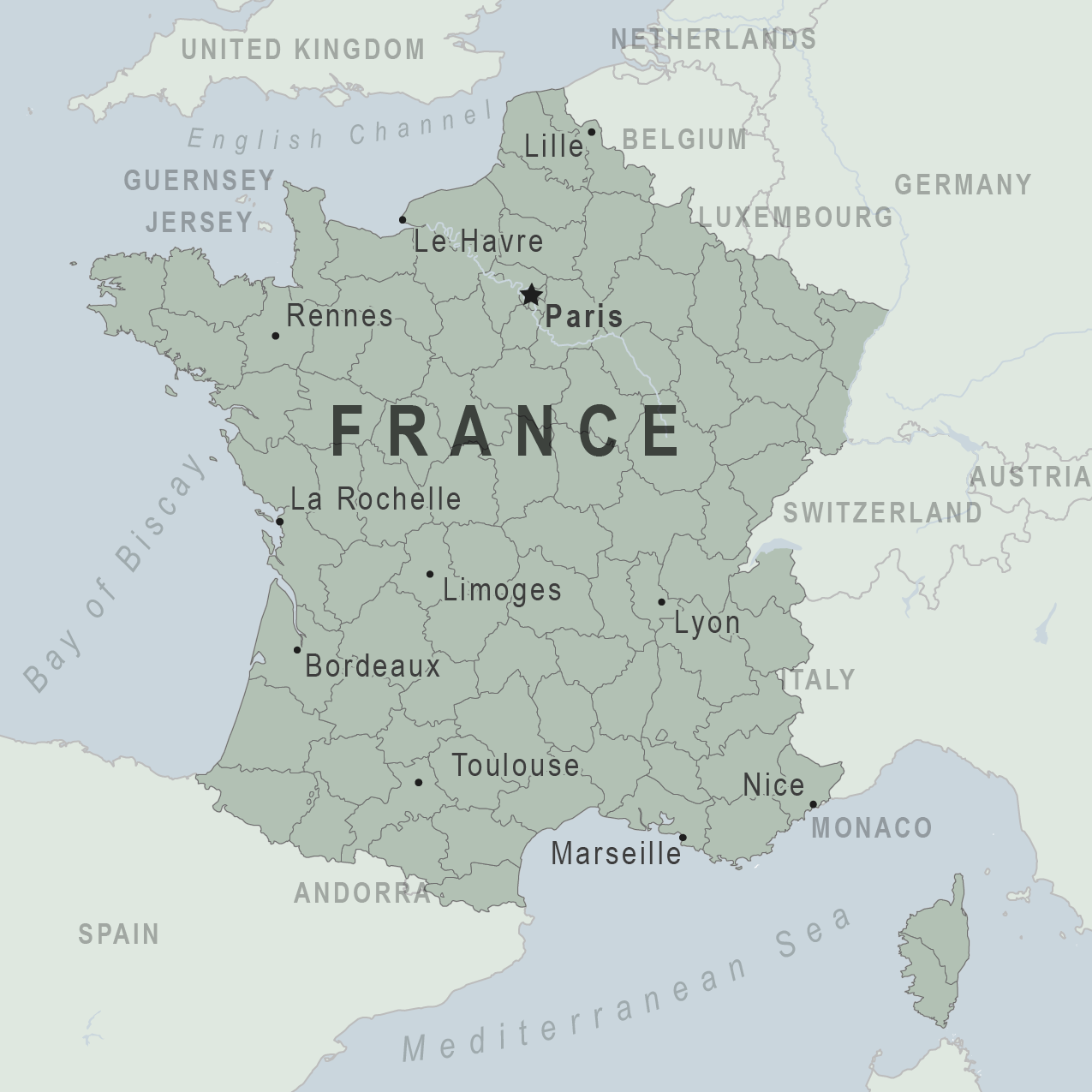
There are no notices currently in effect for France.
⇧ Top
Check the vaccines and medicines list and visit your doctor at least a month before your trip to get vaccines or medicines you may need. If you or your doctor need help finding a location that provides certain vaccines or medicines, visit the Find a Clinic page.
Routine vaccines
Recommendations.
Make sure you are up-to-date on all routine vaccines before every trip. Some of these vaccines include
- Chickenpox (Varicella)
- Diphtheria-Tetanus-Pertussis
- Flu (influenza)
- Measles-Mumps-Rubella (MMR)
Immunization schedules
All eligible travelers should be up to date with their COVID-19 vaccines. Please see Your COVID-19 Vaccination for more information.
COVID-19 vaccine
Hepatitis A
Consider hepatitis A vaccination for most travelers. It is recommended for travelers who will be doing higher risk activities, such as visiting smaller cities, villages, or rural areas where a traveler might get infected through food or water. It is recommended for travelers who plan on eating street food.
Hepatitis A - CDC Yellow Book
Dosing info - Hep A
Hepatitis B
Recommended for unvaccinated travelers younger than 60 years old traveling to France. Unvaccinated travelers 60 years and older may get vaccinated before traveling to France.
Hepatitis B - CDC Yellow Book
Dosing info - Hep B
Cases of measles are on the rise worldwide. Travelers are at risk of measles if they have not been fully vaccinated at least two weeks prior to departure, or have not had measles in the past, and travel internationally to areas where measles is spreading.
All international travelers should be fully vaccinated against measles with the measles-mumps-rubella (MMR) vaccine, including an early dose for infants 6–11 months, according to CDC’s measles vaccination recommendations for international travel .
Measles (Rubeola) - CDC Yellow Book
Dogs infected with rabies are not commonly found in France.
If rabies exposures occur while in France, rabies vaccines are typically available throughout most of the country.
Rabies pre-exposure vaccination considerations include whether travelers 1) will be performing occupational or recreational activities that increase risk for exposure to potentially rabid animals and 2) might have difficulty getting prompt access to safe post-exposure prophylaxis.
Please consult with a healthcare provider to determine whether you should receive pre-exposure vaccination before travel.
For more information, see country rabies status assessments .
Rabies - CDC Yellow Book
Tick-borne Encephalitis
Avoid bug bites.
Learn more about tick-borne encephalitis at your destination .
Tick-borne Encephalitis - CDC Yellow Book
Avoid contaminated water
Leptospirosis
How most people get sick (most common modes of transmission)
- Touching urine or other body fluids from an animal infected with leptospirosis
- Swimming or wading in urine-contaminated fresh water, or contact with urine-contaminated mud
- Drinking water or eating food contaminated with animal urine
- Avoid contaminated water and soil
- Avoid floodwater
Clinical Guidance
Leishmaniasis
- Sand fly bite
- Avoid Bug Bites
- Mosquito bite
- An infected pregnant woman can spread it to her unborn baby
Airborne & droplet
- Breathing in air or accidentally eating food contaminated with the urine, droppings, or saliva of infected rodents
- Bite from an infected rodent
- Less commonly, being around someone sick with hantavirus (only occurs with Andes virus)
- Avoid rodents and areas where they live
- Avoid sick people
Parvovirus B19
- Virus droplets from a cough or sneeze getting in your eyes, nose, or mouth
- Direct contact with the virus, like kissing the face of a child with parvovirus B19
- Touching a surface with the virus on it, like a doorknob, and then touching your face before washing your hands
- An infected pregnant person can spread it to their unborn baby
- Wash your hands often with soap and water
- Avoid touching your eyes, nose, and mouth
- Avoid crowded areas where you may be unable to maintain physical distance
- People who are pregnant , have blood disorders (e.g. sickle cell or thalassemia), or are immunocompromised are at higher risk for severe disease. If you are in these groups and are exposed to or contract parvovirus B-19, contact your healthcare provider.
Prevention and Treatment
Tuberculosis (TB)
- Breathe in TB bacteria that is in the air from an infected and contagious person coughing, speaking, or singing.
Learn actions you can take to stay healthy and safe on your trip. Vaccines cannot protect you from many diseases in France, so your behaviors are important.
Eat and drink safely
Food and water standards around the world vary based on the destination. Standards may also differ within a country and risk may change depending on activity type (e.g., hiking versus business trip). You can learn more about safe food and drink choices when traveling by accessing the resources below.
- Choose Safe Food and Drinks When Traveling
- Water Treatment Options When Hiking, Camping or Traveling
- Global Water, Sanitation and Hygiene | Healthy Water
- Avoid Contaminated Water During Travel
You can also visit the Department of State Country Information Pages for additional information about food and water safety.
Prevent bug bites
Although France is an industrialized country, bug bites here can still spread diseases. Just as you would in the United States, try to avoid bug bites while spending time outside or in wooded areas.
What can I do to prevent bug bites?
- Cover exposed skin by wearing long-sleeved shirts, long pants, and hats.
- Use an appropriate insect repellent (see below).
- Consider using permethrin-treated clothing and gear if spending a lot of time outside. Do not use permethrin directly on skin.
What type of insect repellent should I use?
- FOR PROTECTION AGAINST TICKS AND MOSQUITOES: Use a repellent that contains 20% or more DEET for protection that lasts up to several hours.
- Picaridin (also known as KBR 3023, Bayrepel, and icaridin)
- Oil of lemon eucalyptus (OLE) or para-menthane-diol (PMD)
- 2-undecanone
- Always use insect repellent as directed.
What should I do if I am bitten by bugs?
- Avoid scratching bug bites, and apply hydrocortisone cream or calamine lotion to reduce the itching.
- Check your entire body for ticks after outdoor activity. Be sure to remove ticks properly.
What can I do to avoid bed bugs?
Although bed bugs do not carry disease, they are an annoyance. See our information page about avoiding bug bites for some easy tips to avoid them. For more information on bed bugs, see Bed Bugs .
For more detailed information on avoiding bug bites, see Avoid Bug Bites .
Stay safe outdoors
If your travel plans in France include outdoor activities, take these steps to stay safe and healthy during your trip:
- Stay alert to changing weather conditions and adjust your plans if conditions become unsafe.
- Prepare for activities by wearing the right clothes and packing protective items, such as bug spray, sunscreen, and a basic first aid kit.
- Consider learning basic first aid and CPR before travel. Bring a travel health kit with items appropriate for your activities.
- If you are outside for many hours in the heat, eat salty snacks and drink water to stay hydrated and replace salt lost through sweating.
- Protect yourself from UV radiation : use sunscreen with an SPF of at least 15, wear protective clothing, and seek shade during the hottest time of day (10 a.m.–4 p.m.).
- Be especially careful during summer months and at high elevation. Because sunlight reflects off snow, sand, and water, sun exposure may be increased during activities like skiing, swimming, and sailing.
- Very cold temperatures can be dangerous. Dress in layers and cover heads, hands, and feet properly if you are visiting a cold location.
Stay safe around water
- Swim only in designated swimming areas. Obey lifeguards and warning flags on beaches.
- Do not dive into shallow water.
- Avoid swallowing water when swimming. Untreated water can carry germs that make you sick.
- Practice safe boating—follow all boating safety laws, do not drink alcohol if you are driving a boat, and always wear a life jacket.
Keep away from animals
Most animals avoid people, but they may attack if they feel threatened, are protecting their young or territory, or if they are injured or ill. Animal bites and scratches can lead to serious diseases such as rabies.
Follow these tips to protect yourself:
- Do not touch or feed any animals you do not know.
- Do not allow animals to lick open wounds, and do not get animal saliva in your eyes or mouth.
- Avoid rodents and their urine and feces.
- Traveling pets should be supervised closely and not allowed to come in contact with local animals.
- If you wake in a room with a bat, seek medical care immediately. Bat bites may be hard to see.
All animals can pose a threat, but be extra careful around dogs, bats, monkeys, sea animals such as jellyfish, and snakes. If you are bitten or scratched by an animal, immediately:
- Wash the wound with soap and clean water.
- Go to a doctor right away.
- Tell your doctor about your injury when you get back to the United States.
Reduce your exposure to germs
Follow these tips to avoid getting sick or spreading illness to others while traveling:
- Wash your hands often, especially before eating.
- If soap and water aren’t available, clean hands with hand sanitizer (containing at least 60% alcohol).
- Don’t touch your eyes, nose, or mouth. If you need to touch your face, make sure your hands are clean.
- Cover your mouth and nose with a tissue or your sleeve (not your hands) when coughing or sneezing.
- Try to avoid contact with people who are sick.
- If you are sick, stay home or in your hotel room, unless you need medical care.
Avoid sharing body fluids
Diseases can be spread through body fluids, such as saliva, blood, vomit, and semen.
Protect yourself:
- Use latex condoms correctly.
- Do not inject drugs.
- Limit alcohol consumption. People take more risks when intoxicated.
- Do not share needles or any devices that can break the skin. That includes needles for tattoos, piercings, and acupuncture.
- If you receive medical or dental care, make sure the equipment is disinfected or sanitized.
Know how to get medical care while traveling
Plan for how you will get health care during your trip, should the need arise:
- Carry a list of local doctors and hospitals at your destination.
- Review your health insurance plan to determine what medical services it would cover during your trip. Consider purchasing travel health and medical evacuation insurance for things your regular insurance will not cover.
- Carry a card that identifies, in the local language, your blood type, chronic conditions or serious allergies, and the generic names of any medicines you take.
- Bring copies of your prescriptions for medicine and for eye glasses and contact lenses.
- Some prescription drugs may be illegal in other countries. Call France’s embassy to verify that all of your prescription(s) are legal to bring with you.
- Bring all the medicines (including over-the-counter medicines) you think you might need during your trip, including extra in case of travel delays. Ask your doctor to help you get prescriptions filled early if you need to.
Many foreign hospitals and clinics are accredited by the Joint Commission International. A list of accredited facilities is available at their website ( www.jointcommissioninternational.org ).
Select safe transportation
Motor vehicle crashes are the #1 killer of healthy US citizens in foreign countries.
Be smart when you are traveling on foot.
- Use sidewalks and marked crosswalks.
- Pay attention to the traffic around you, especially in crowded areas.
- Remember, people on foot do not always have the right of way in other countries.
Riding/Driving
Choose a safe vehicle.
- Choose official taxis or public transportation, such as trains and buses.
- Make sure there are seatbelts.
- Avoid overcrowded, overloaded, top-heavy buses and minivans.
- Avoid riding on motorcycles or motorbikes, especially motorbike taxis. (Many crashes are caused by inexperienced motorbike drivers.)
- Choose newer vehicles—they may have more safety features, such as airbags, and be more reliable.
- Choose larger vehicles, which may provide more protection in crashes.
Think about the driver.
- Do not drive after drinking alcohol or ride with someone who has been drinking.
- Consider hiring a licensed, trained driver familiar with the area.
- Arrange payment before departing.
Follow basic safety tips.
- Wear a seatbelt at all times.
- Sit in the back seat of cars and taxis.
- When on motorbikes or bicycles, always wear a helmet. (Bring a helmet from home, if needed.)
- Do not use a cell phone or text while driving (illegal in many countries).
- Travel during daylight hours only, especially in rural areas.
- If you choose to drive a vehicle in France, learn the local traffic laws and have the proper paperwork.
- Get any driving permits and insurance you may need. Get an International Driving Permit (IDP). Carry the IDP and a US-issued driver's license at all times.
- Check with your auto insurance policy's international coverage, and get more coverage if needed. Make sure you have liability insurance.
- Avoid using local, unscheduled aircraft.
- If possible, fly on larger planes (more than 30 seats); larger airplanes are more likely to have regular safety inspections.
- Try to schedule flights during daylight hours and in good weather.
Helpful Resources
Road Safety Overseas (Information from the US Department of State): Includes tips on driving in other countries, International Driving Permits, auto insurance, and other resources.
The Association for International Road Travel has country-specific Road Travel Reports available for most countries for a minimal fee.
Maintain personal security
Use the same common sense traveling overseas that you would at home, and always stay alert and aware of your surroundings.
Before you leave
- Research your destination(s), including local laws, customs, and culture.
- Monitor travel advisories and alerts and read travel tips from the US Department of State.
- Enroll in the Smart Traveler Enrollment Program (STEP) .
- Leave a copy of your itinerary, contact information, credit cards, and passport with someone at home.
- Pack as light as possible, and leave at home any item you could not replace.
While at your destination(s)
- Carry contact information for the nearest US embassy or consulate .
- Carry a photocopy of your passport and entry stamp; leave the actual passport securely in your hotel.
- Follow all local laws and social customs.
- Do not wear expensive clothing or jewelry.
- Always keep hotel doors locked, and store valuables in secure areas.
- If possible, choose hotel rooms between the 2nd and 6th floors.
Healthy Travel Packing List
Use the Healthy Travel Packing List for France for a list of health-related items to consider packing for your trip. Talk to your doctor about which items are most important for you.
Why does CDC recommend packing these health-related items?
It’s best to be prepared to prevent and treat common illnesses and injuries. Some supplies and medicines may be difficult to find at your destination, may have different names, or may have different ingredients than what you normally use.
If you are not feeling well after your trip, you may need to see a doctor. If you need help finding a travel medicine specialist, see Find a Clinic . Be sure to tell your doctor about your travel, including where you went and what you did on your trip. Also tell your doctor if you were bitten or scratched by an animal while traveling.
For more information on what to do if you are sick after your trip, see Getting Sick after Travel .
Map Disclaimer - The boundaries and names shown and the designations used on maps do not imply the expression of any opinion whatsoever on the part of the Centers for Disease Control and Prevention concerning the legal status of any country, territory, city or area or of its authorities, or concerning the delimitation of its frontiers or boundaries. Approximate border lines for which there may not yet be full agreement are generally marked.
Other Destinations
If you need help finding travel information:
Message & data rates may apply. CDC Privacy Policy
File Formats Help:
- Adobe PDF file
- Microsoft PowerPoint file
- Microsoft Word file
- Microsoft Excel file
- Audio/Video file
- Apple Quicktime file
- RealPlayer file
- Zip Archive file
Exit Notification / Disclaimer Policy
- The Centers for Disease Control and Prevention (CDC) cannot attest to the accuracy of a non-federal website.
- Linking to a non-federal website does not constitute an endorsement by CDC or any of its employees of the sponsors or the information and products presented on the website.
- You will be subject to the destination website's privacy policy when you follow the link.
- CDC is not responsible for Section 508 compliance (accessibility) on other federal or private website.
France bans unvaccinated U.S. tourists: Here’s what to expect when you travel to the country

Editor's note: This story has been updated as of September 10, 2021, to reflect that France moved the U.S. back to its orange list of countries. Travelers from the U.S. are now subject to stricter entry restrictions. The author traveled to France while the country was on the orange list in June.
As of June 9, 2021, France has reopened its borders to international travelers. Those coming from the U.S. must possess proof of vaccination to the country without mandatory quarantine. As of Sept. 10, unvaccinated U.S. travelers are no longer allowed to enter with proof of a negative COVID-19 test. They are only allowed to enter France for essential reasons as the U.S. has been placed back on France's orange list (more on that below).
I'm a huge fan of France and was ecstatic to hear the reopening news. Naturally, I hopped on one of the first flights to Paris (CDG) that arrived just hours after the new regulations went into effect.
Here, I'll give you a look at my experience entering France under the new coronavirus entry restrictions.
I'll start with a quick overview of what Americans need to bring for entry to France and then discuss my travel experience, from checking in at New York-JFK to clearing customs at Paris (CDG) .
Let's get started!
For more TPG news delivered each morning to your inbox, sign up for our free daily newsletter .
Overview of France's entry requirements (and what to bring)

France implemented a "stoplight" system for tourists entering the country back in June. There are three different colors: green, orange and red. The U.S. is now back on the orange list of countries due to rising coronavirus cases.
Requirements for entering France from the U.S. and other orange countries
You can only enter France from an orange country if you're vaccinated and sign a sworn declaration that you have no symptoms of COVID-19. Here's a look at the vaccine requirements:
- Proof of your vaccination — the following vaccines are accepted:
- AstraZeneca
- Johnson & Johnson
Regardless of where you depart, you must wait a set amount of time after your COVID-19 vaccine in order to enter France. The wait time depends on which vaccine you received:
- Two weeks after the second injection for two injection vaccines (Pfizer, Moderna, AstraZeneca)
- Four weeks after the injection for single injection vaccines (Johnson & Johnson)
- Seven days after injection for vaccines administered to people who have already had COVID-19, only one dose required
Unvaccinated travelers from orange countries are no longer allowed to visit France for non-essential travel. Those with pressing reasons for travel must provide a negative PCR or antigen test taken within 72 and 48 hours of boarding your flight, respectively. Additionally, self-isolation for seven days is mandatory.
Unvaccinated travelers from "green" countries are still allowed to enter France but are subject to test requirements. This includes Canada, the Schengen Area and others.
Note that a digital health pass is now required for many activities in France, including dining at restaurants and cafes. This pass proves that a traveler is fully vaccinated or possesses a recent negative COVID test. Check out TPG's full guide to obtaining a French health pass for more information.
Related: What you need to know about COVID-19 vaccines in the US
My experience flying Delta to Paris
Every trip from the U.S. to France starts with a flight across the Atlantic. I chose to fly Delta Air Lines from New York-JFK to Paris (CDG). Here's a quick look at my check-in and in-flight experience.
When I traveled to France, vaccinated travelers were still required to get a pre-departure COVID-19 test. I went to a CVS Minute Clinic in Manhattan roughly 36 hours prior to departing to get a COVID-19 antigen test. This is referred to as a "rapid test" because it provides results within 20 mins of testing. My test came back negative, but I wasn't surprised as I've been vaccinated against COVID-19 since early March.
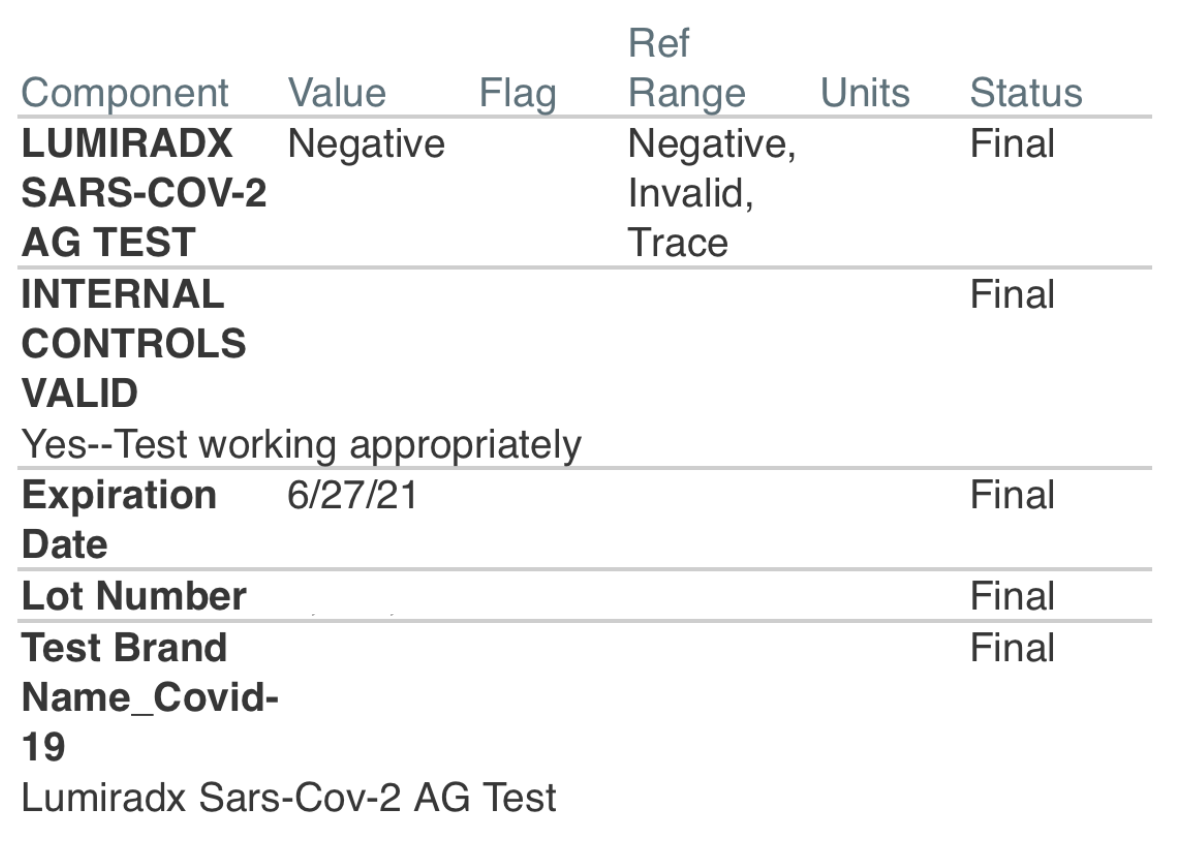
Now for a bit of worry. I attempted to check in to my flight 24-hours before departure, as usual. The Delta app stated that I must have a PCR test that was less than 72 hours old in order to fly to France and it didn't mention an antigen test. While concerning, I chalked this up to outdated app copy, but I was a bit worried as there was no place to get a PCR test in time for my flight.
Again, this wouldn't have been an issue if I traveled under the current requirements for vaccinated travelers.
The next day, I took a Lyft from my home in Queens to JFK airport. I was booked in Delta Main Cabin but used Delta SkyMiles to upgrade my ticket to Delta One , so I used the SkyPriority lane at check-in to get my boarding pass and check a bag.
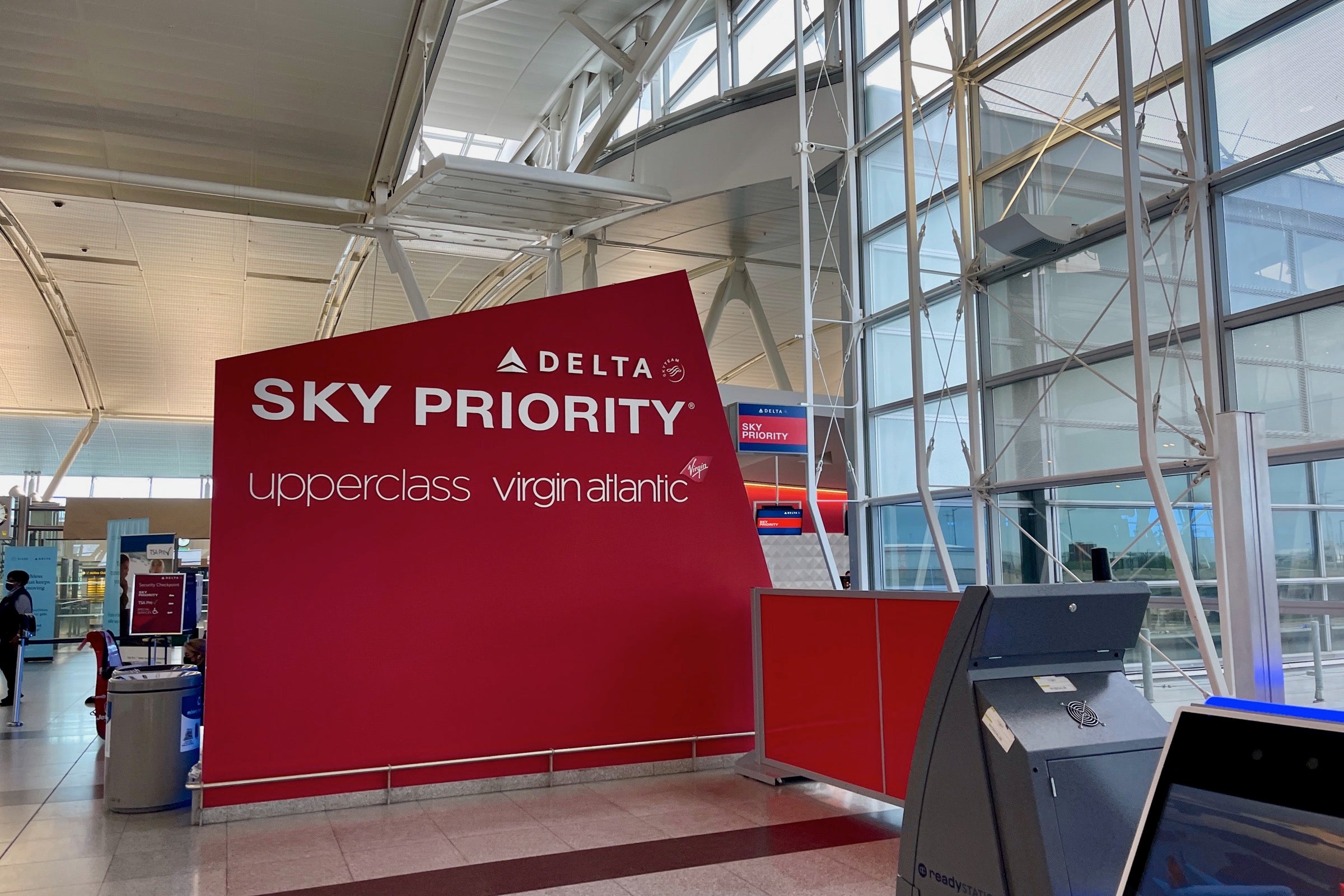
The process was smooth. The woman at the check-in counter asked if I had a PCR test that was less than 72 hours old. I told her I had an antigen test less than 48 hours old. She checked something on the computer, took my passport and then asked to see my antigen test and COVID-19 vaccine card. She confirmed everything was correct and I was on my way.
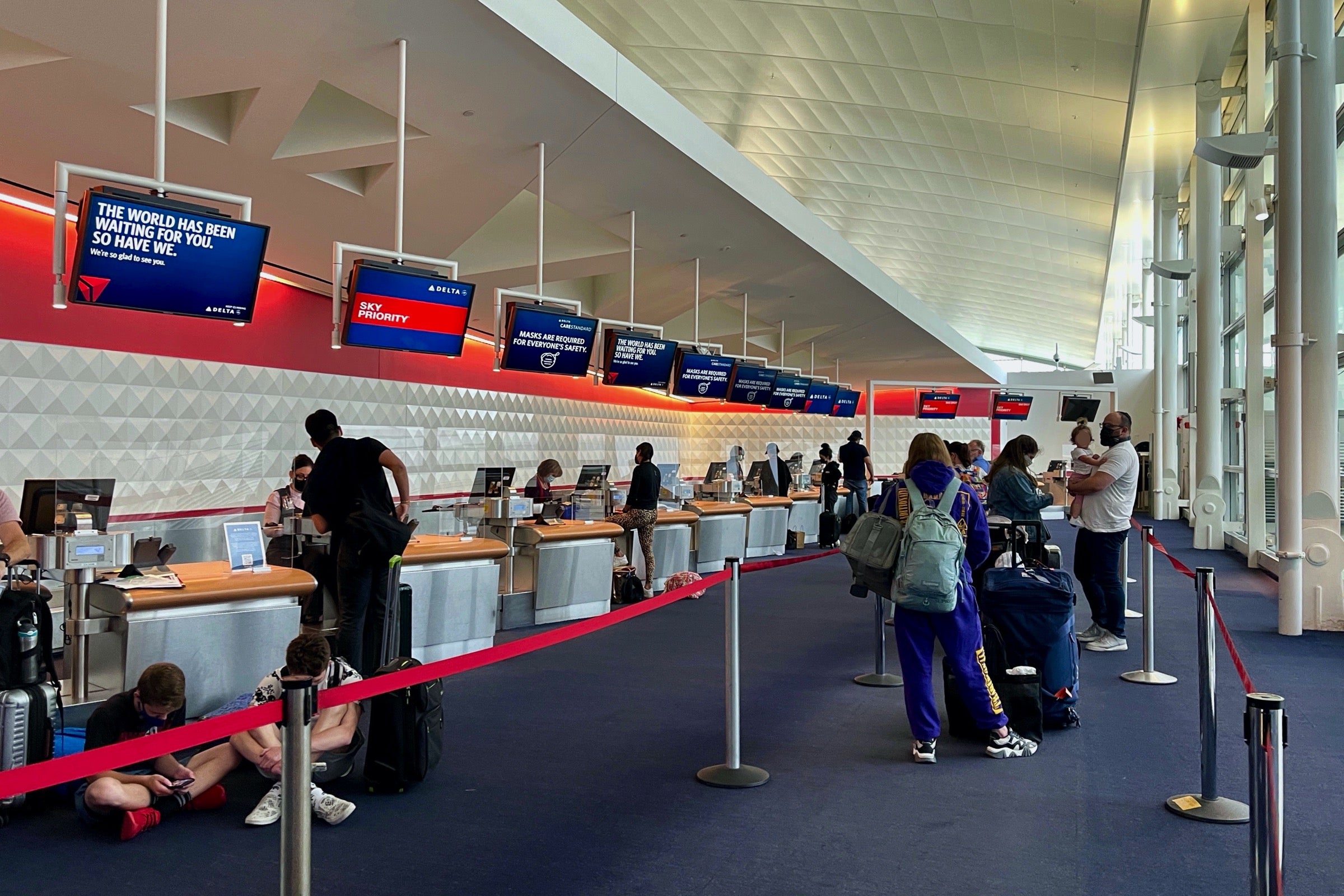
After this, I went to the American Express Centurion Lounge and waited for my flight.
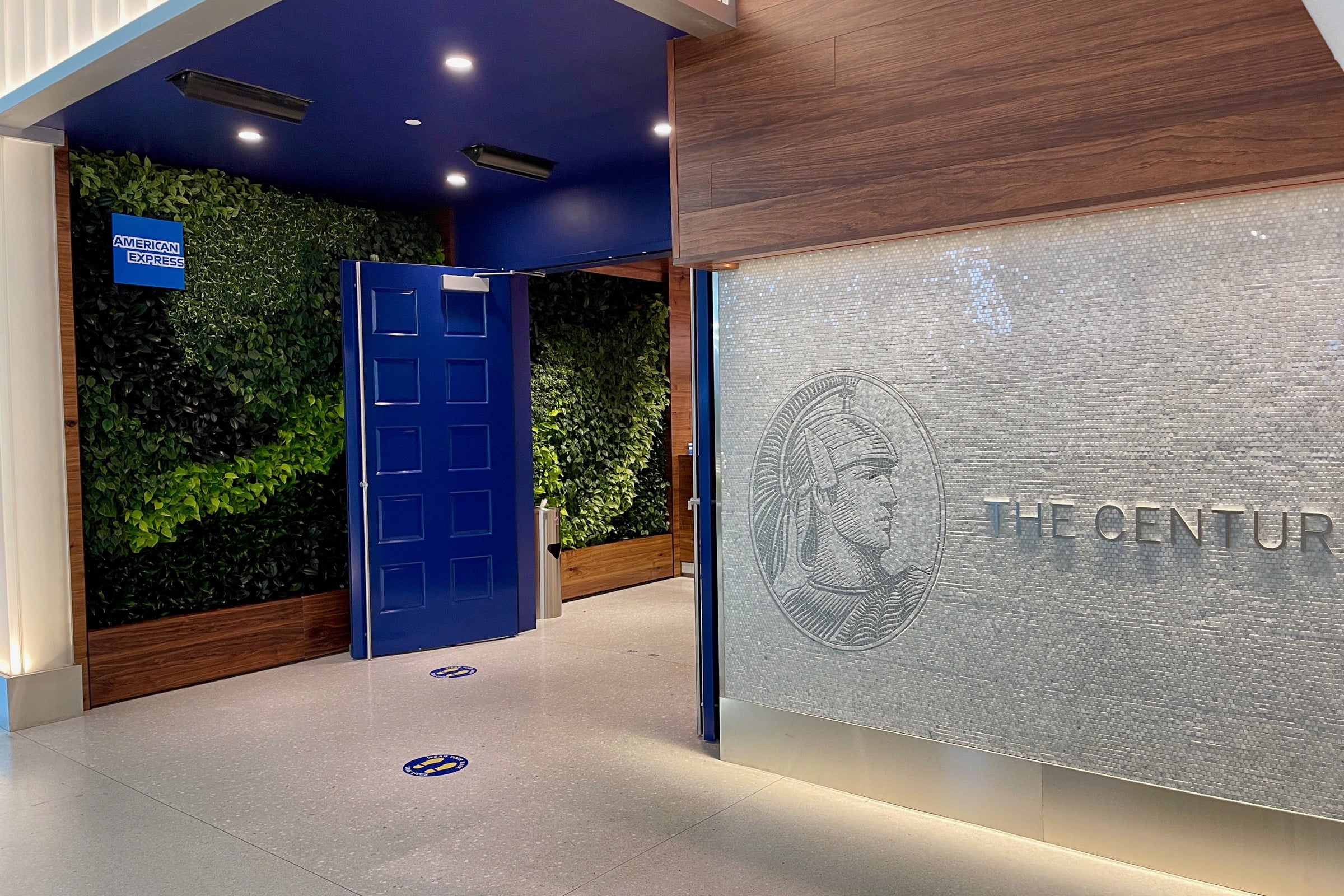
When it was time to board, I walked to my gate and boarded using Delta's touchless, facial-recognition-powered boarding process . No one at the gate asked about my COVID-19 test.
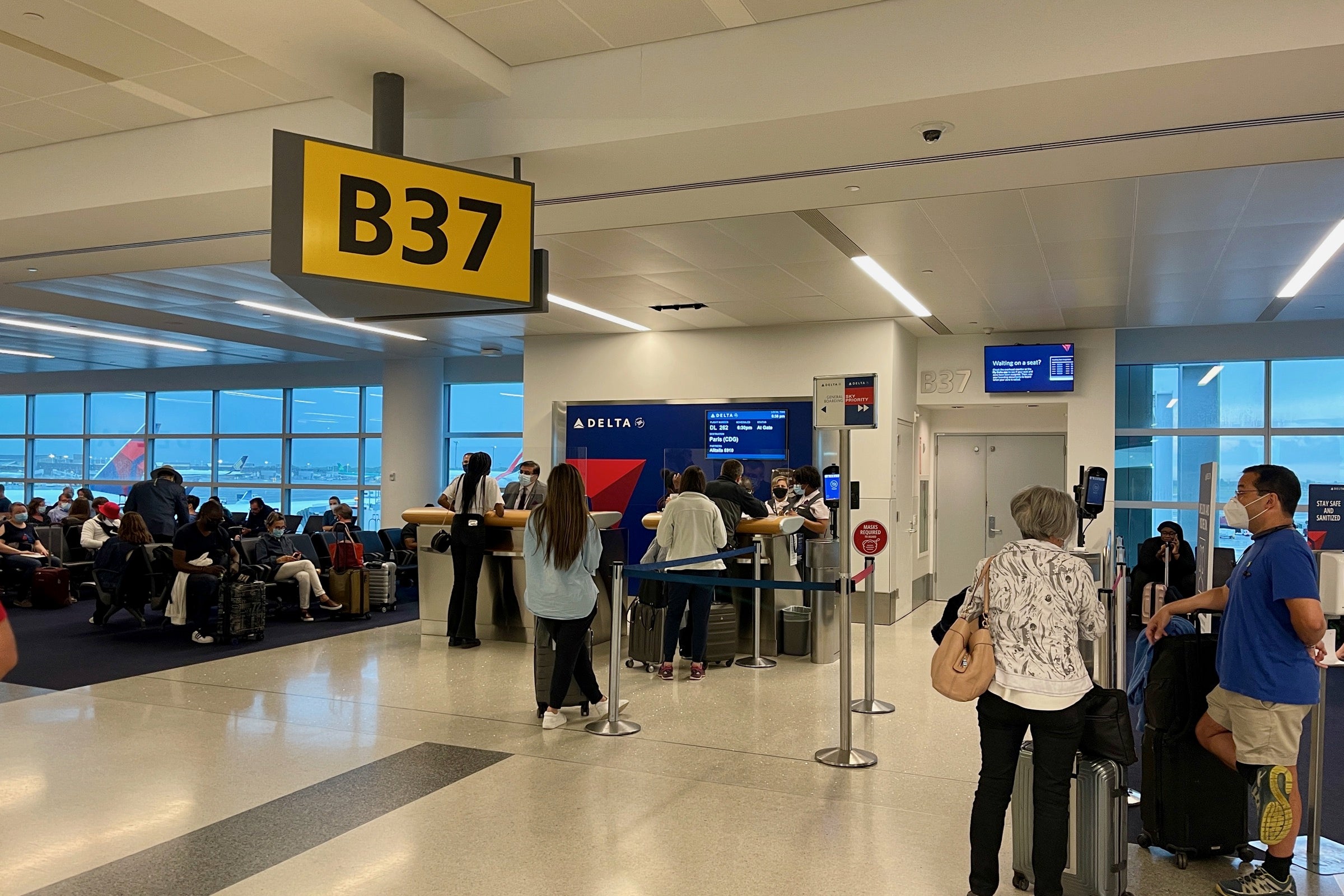
The flight was remarkably packed for a mid-pandemic transatlantic flight. Delta One was almost full and there were many groups of families in the economy cabin. You could sense the excitement in the air.
The flight mostly went on as normal with food and drink service. Plus, the Delta One Suites on the airline's A330-900neo were excellent for working and catching a few hours of sleep en route to Paris.
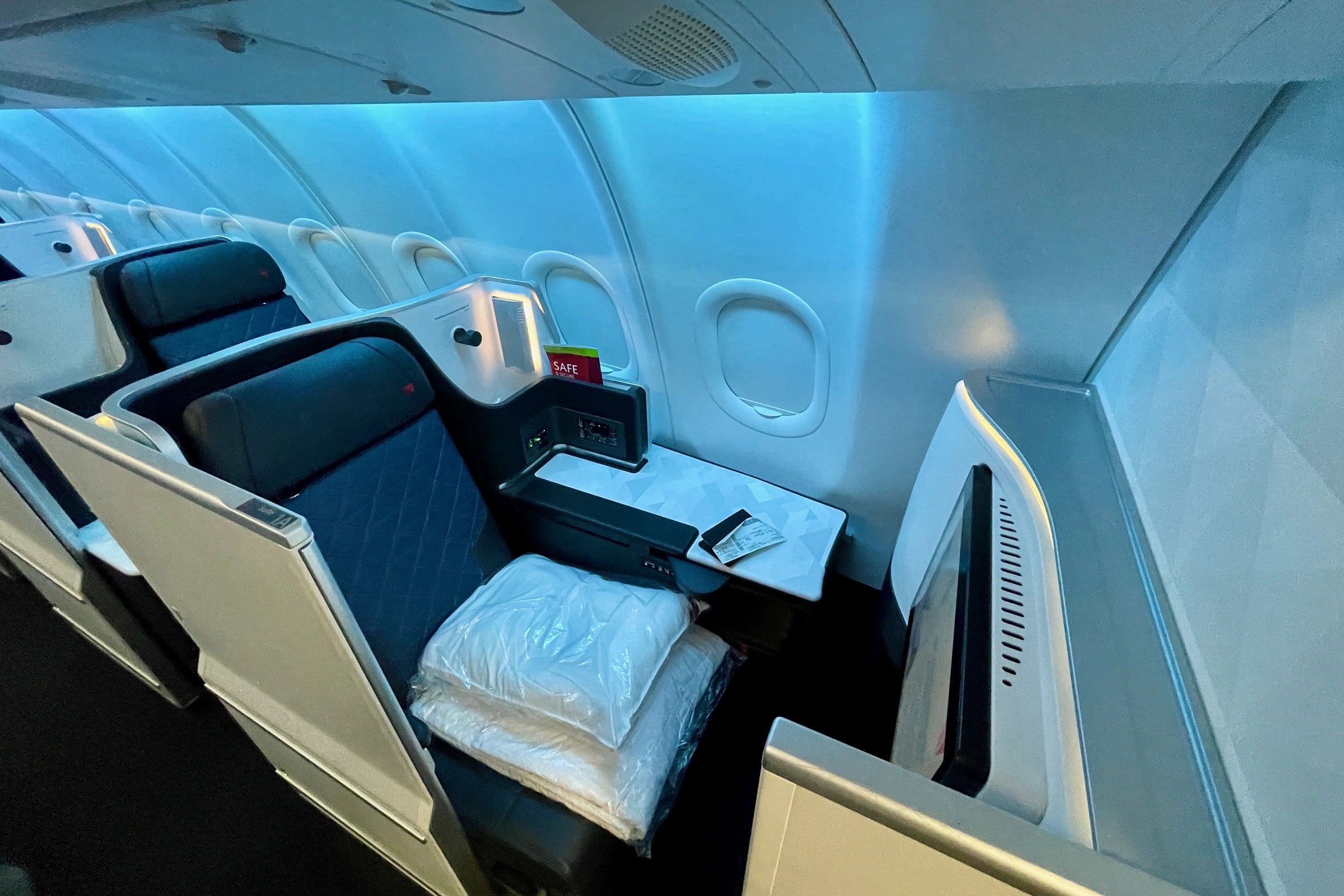
Shortly before arrival, we were given a sworn health declaration to sign and a contact tracing form. The health declaration form would be collected at the border while the flight attendants picked up our contact tracing form before we deplaned.
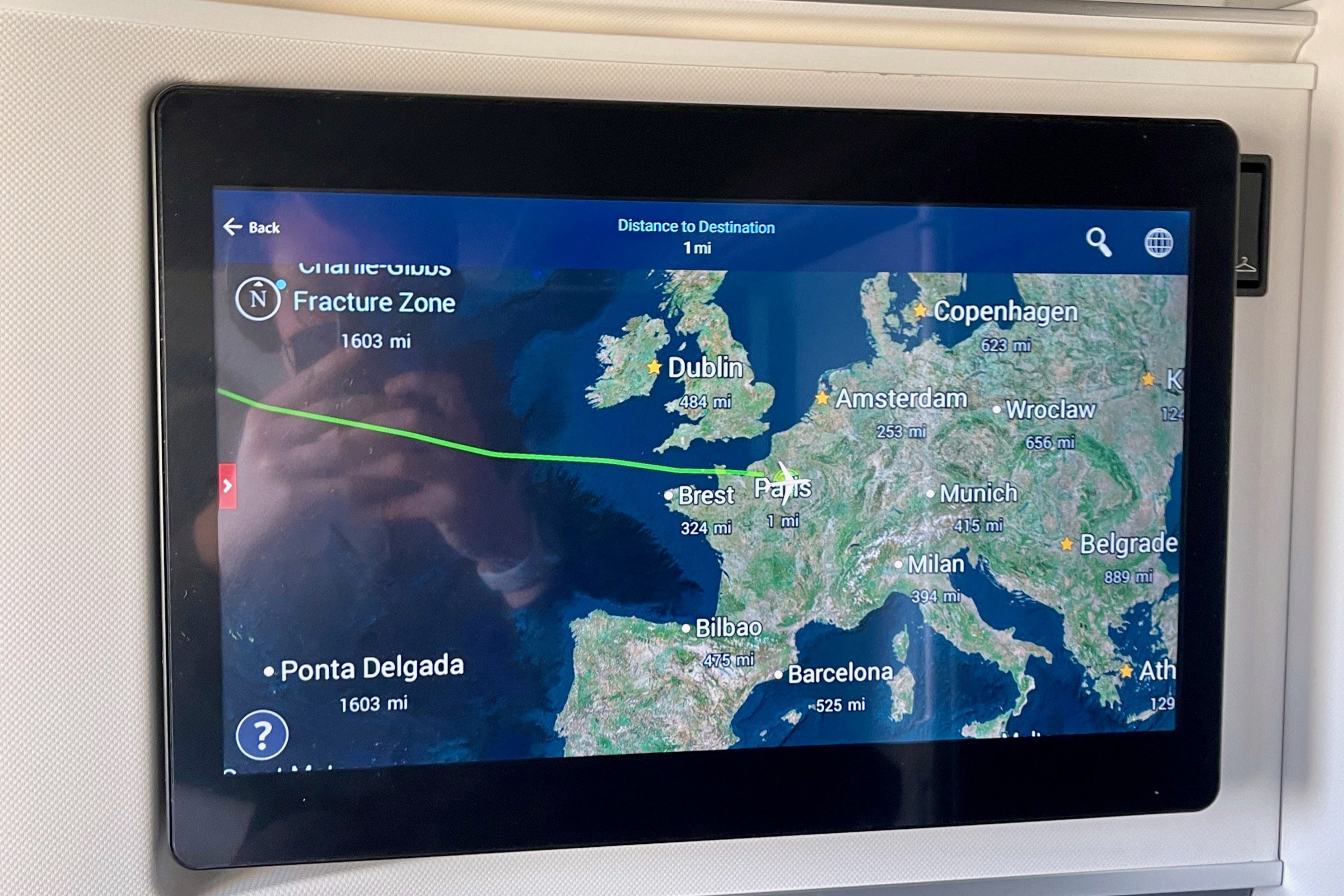
The sworn declaration form may not actually be necessary. It laid out old entry rules (mandatory PCR test, seven-day quarantine) and asked you to sign a note saying you have no COVID-19 symptoms and will obey the quarantine. I signed, but border control never asked for my form.
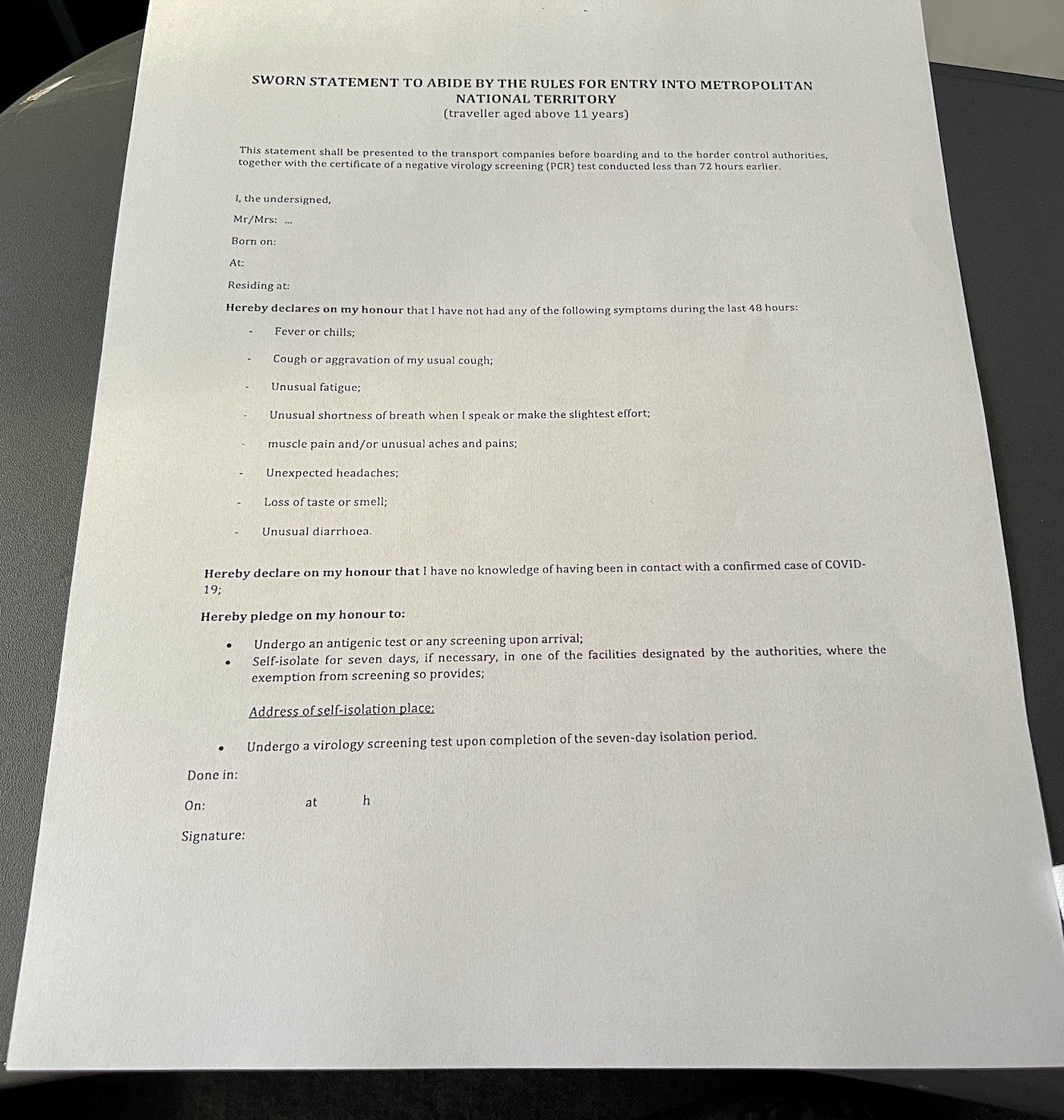
The contact-tracing form was very straightforward too. It just asked for simple information like your flight number, hotel address and other basics.
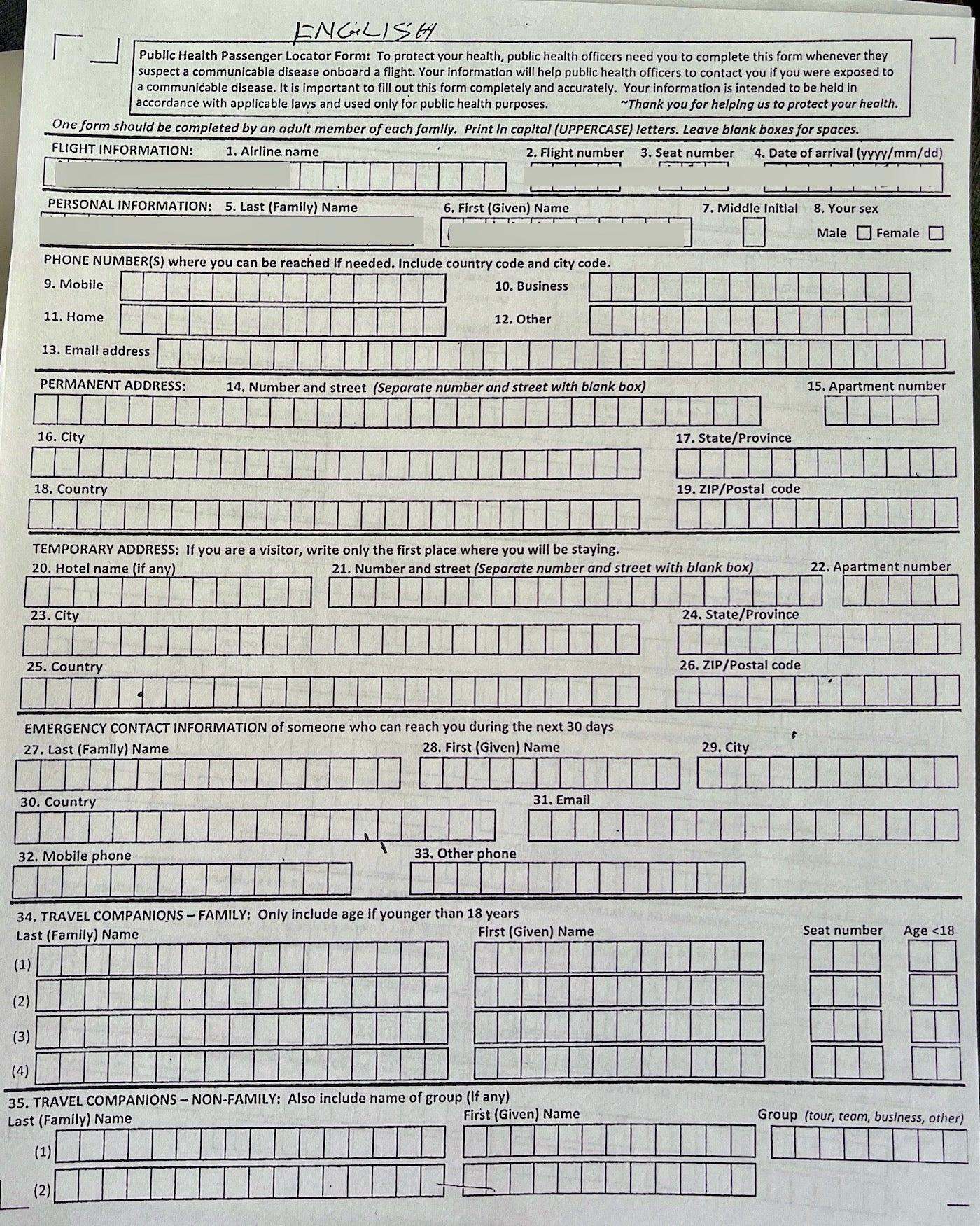
Related: Delta becomes first major carrier to launch contact tracing initiative
Experience at the French border
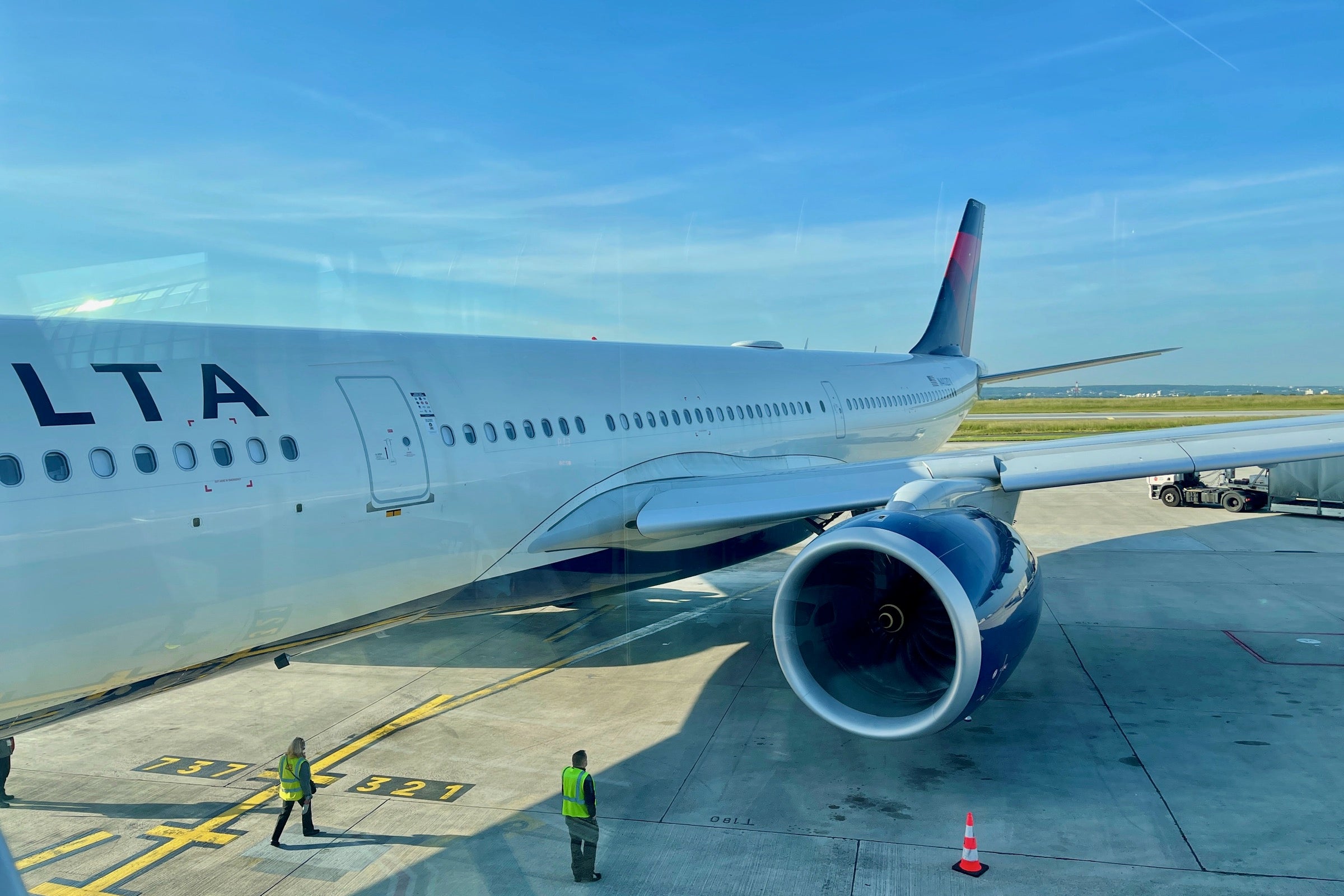
I was one of the first off the plane in Paris (CDG) after landing since I was in the first row of Delta One. I walked through a series of hallways until I reached the border control area, where three immigration desks were open. There was already a short line since a couple of other flights had come in at the same time as ours.
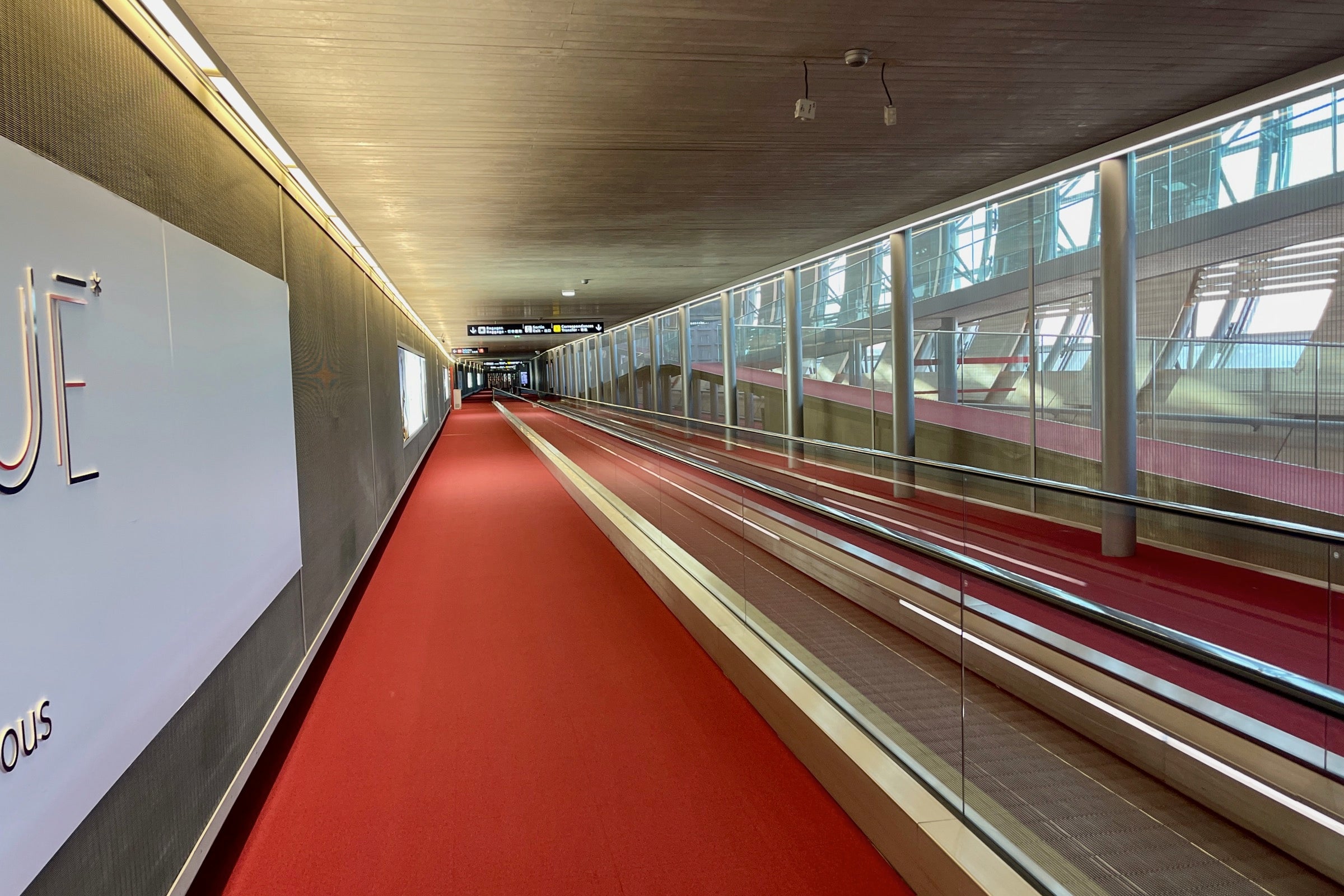
It only took 10 minutes for me to get to the front of the line. Even though I have a European passport , I opted to use my U.S. passport to enter France, so I could better report on my experience in this article.
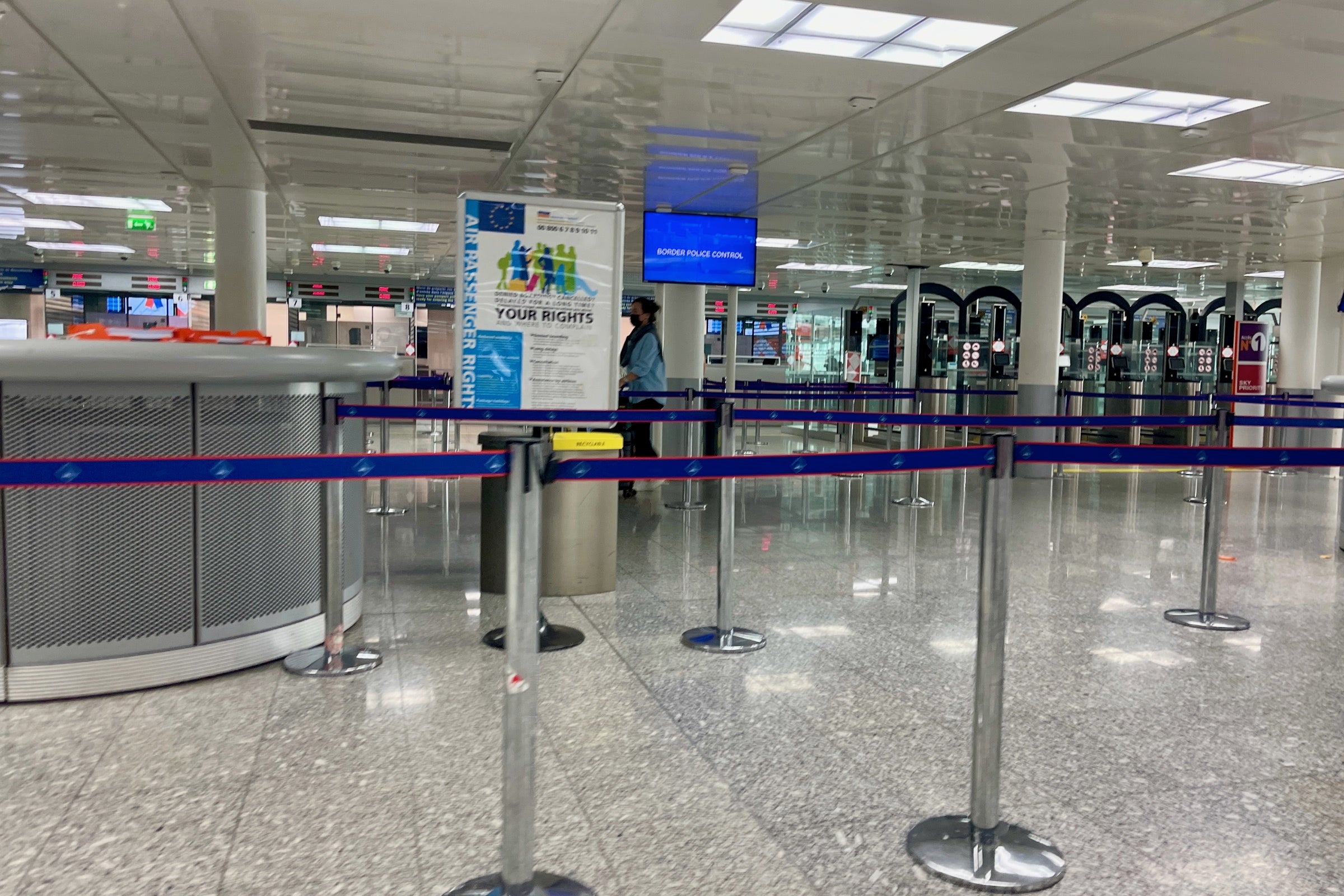
Thankfully, it was a seamless experience.
I handed the border control agent my passport, CDC-issued COVID-19 vaccine card , sworn declaration and my phone that displayed my negative test results. She looked at the documents, handed me back my sworn declaration and stamped my passport. And that was it: I was in the country.
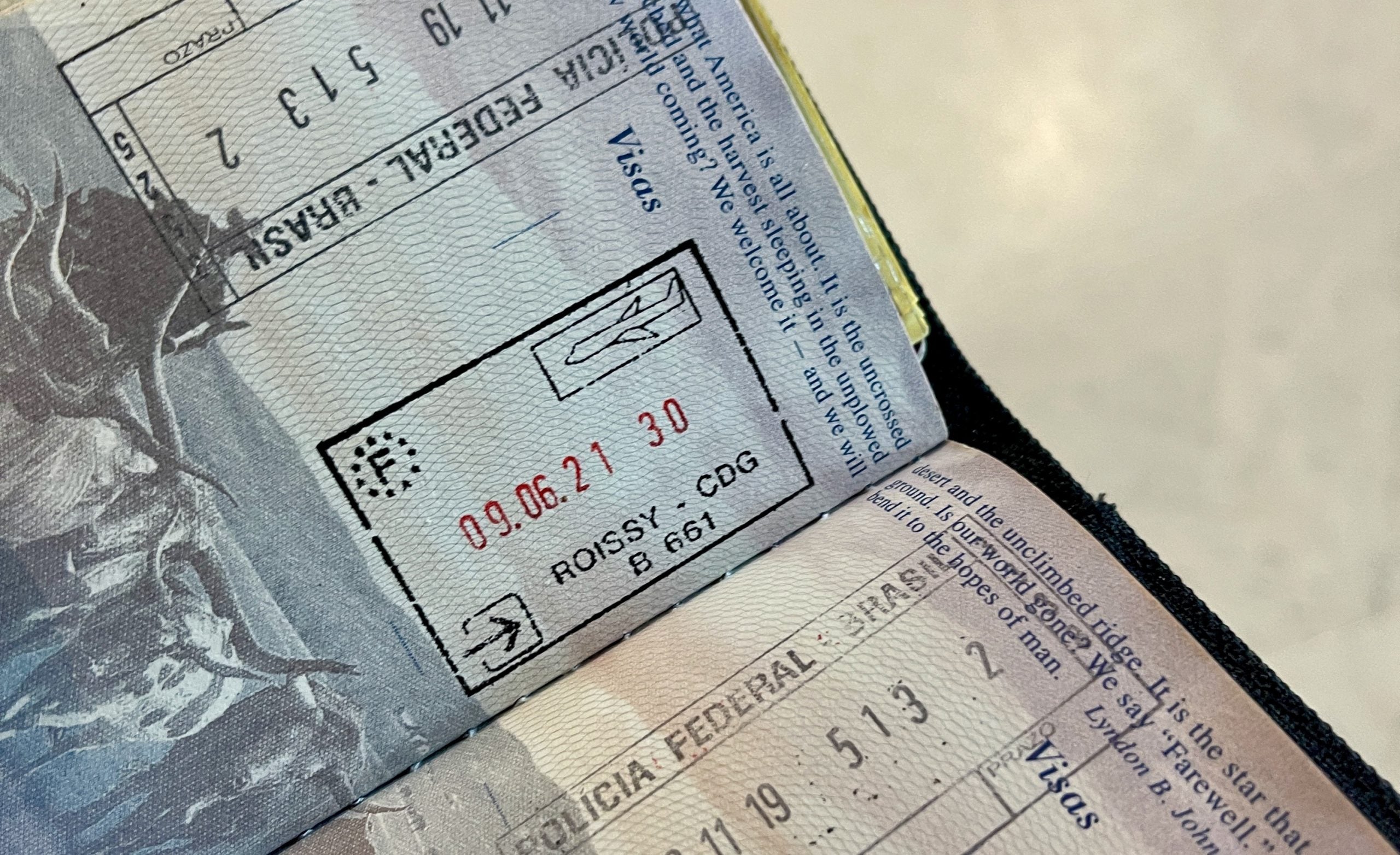
This was in stark contrast to Iceland , where I waited for border control agents to discuss whether or not I should be allowed in. Here, there was barely any communication. The friendly border agent just checked my documents and waved me through.
After this, I took a deep breath of relief, collected my bag and requested an Uber to my hotel in Paris. Trust me, the excitement set in quickly.
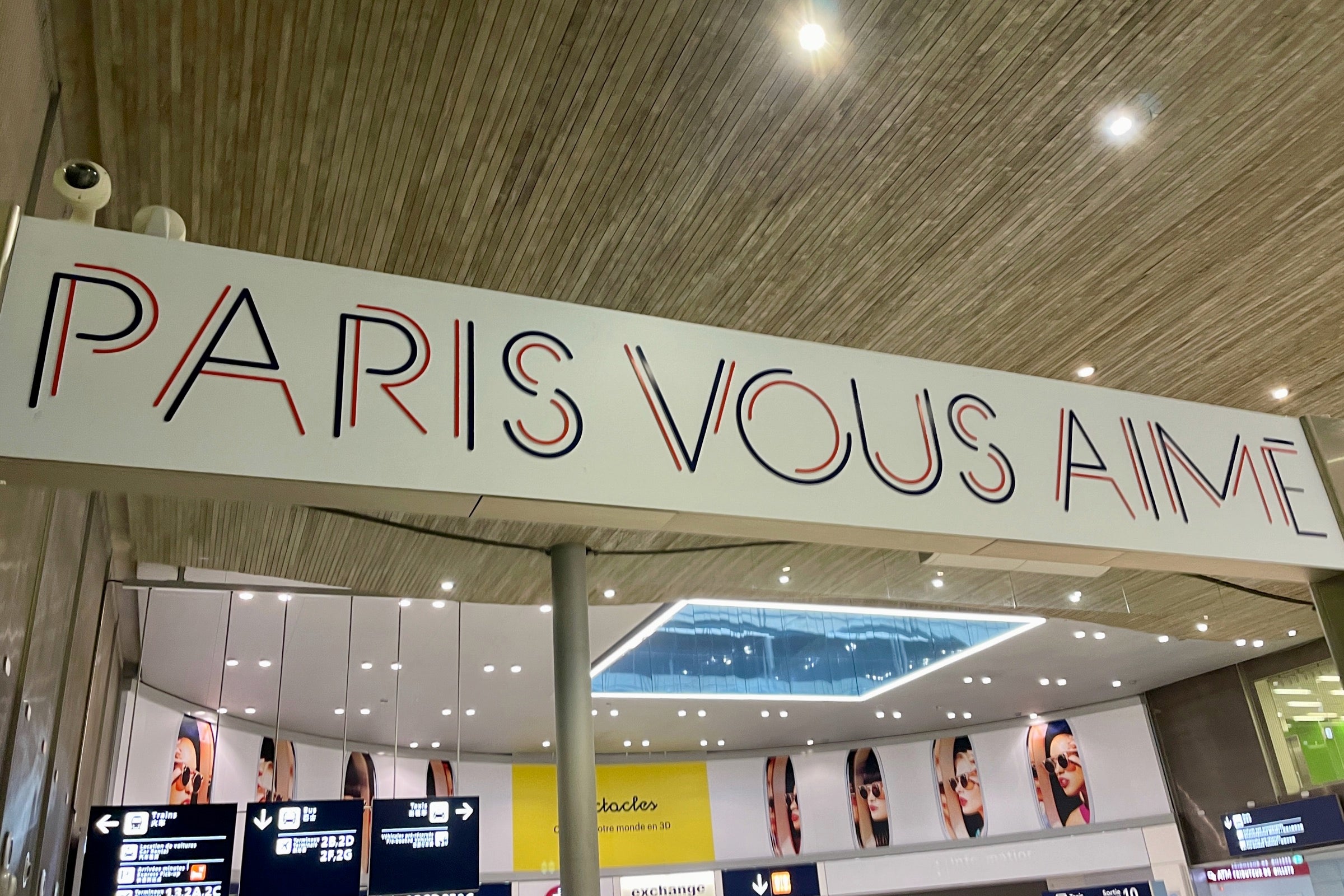
Related: When will international travel return? A country-by-country guide to coronavirus recovery
Checking into my hotel
Also, unlike Iceland, checking into my first hotel in Paris was no different than pre-pandemic times. I was not asked for proof of vaccination or other paperwork, though this may be different now that a health pass is required for many activities. All I had to do was give the front desk clerk my passport and credit card.

Funny enough, another American was checking in after me. I could tell the hotel staff was equally as excited about today's reopening. The front desk clerk happily told us we picked the perfect day to visit, as all restaurants are reopening for indoor dining.
Related: 15 things to see and do on your first trip to Paris
Bottom line
Traveling from the U.S. to France is possible under relaxed border rules, and it's remarkably easy to do. Just wait long enough post-vaccine and you should be good to go.
Because of this simplicity and all that France has to offer, I think we'll see American tourism to France continue to rebound through the end of the year. I highly recommend you make the trip too — especially now that nightly curfew and other restrictions are lifted.
Feature photo by Nikada/Getty Images
France Travel Restrictions
Traveler's COVID-19 vaccination status
Traveling from the United States to France
Open for vaccinated visitors
COVID-19 testing
Not required
Not required for vaccinated visitors
Restaurants
Not required in enclosed environments and public transportation.
France entry details and exceptions
Ready to travel, find flights to france, find stays in france, explore more countries on travel restrictions map, destinations you can travel to now, dominican republic, netherlands, philippines, puerto rico, switzerland, united arab emirates, united kingdom, know when to go.
Sign up for email alerts as countries begin to open - choose the destinations you're interested in so you're in the know.
Can I travel to France from the United States?
Most visitors from the United States, regardless of vaccination status, can enter France.
Can I travel to France if I am vaccinated?
Fully vaccinated visitors from the United States can enter France without restrictions.
Can I travel to France without being vaccinated?
Unvaccinated visitors from the United States can enter France without restrictions.
Do I need a COVID test to enter France?
Visitors from the United States are not required to present a negative COVID-19 PCR test or antigen result upon entering France.
Can I travel to France without quarantine?
Travelers from the United States are not required to quarantine.
Do I need to wear a mask in France?
Mask usage in France is not required in enclosed environments and public transportation.
Are the restaurants and bars open in France?
Restaurants in France are open. Bars in France are .
Cookies on GOV.UK
We use some essential cookies to make this website work.
We’d like to set additional cookies to understand how you use GOV.UK, remember your settings and improve government services.
We also use cookies set by other sites to help us deliver content from their services.
You have accepted additional cookies. You can change your cookie settings at any time.
You have rejected additional cookies. You can change your cookie settings at any time.
Bring photo ID to vote Check what photo ID you'll need to vote in person in the General Election on 4 July.
- Passports, travel and living abroad
- Travel abroad
- Foreign travel advice
Entry requirements
This advice reflects the UK government’s understanding of current rules for people travelling on a full ‘British citizen’ passport from the UK, for the most common types of travel.
The authorities in France set and enforce entry rules. If you’re not sure how these requirements apply to you, contact France’s Embassy in the UK .
Countries may restrict travel or bring in rules at short notice. Check with your travel company or airline for changes.
Visit TravelHealthPro (from the UK’s National Travel Health Network and Centre) for general COVID-19 advice for travellers .
Public spaces
You’re strongly recommended to wear a face mask in health settings. In some areas, people aged 6 and above may need to wear a face mask.
Passport validity requirements
If you are planning to travel to an EU country (except Ireland), or Switzerland, Norway, Iceland, Liechtenstein, Andorra, Monaco, San Marino or Vatican City, follow the Schengen area passport requirements .
Your passport must be:
- issued less than 10 years before the date you enter the country (check the ‘date of issue’)
- valid for at least 3 months after the day you plan to leave (check the ‘expiry date’)
Check your passport meets these requirements before you travel. If your passport was issued before 1 October 2018, extra months may have been added to its expiry date.
Contact the French Embassy in the UK if you think that your passport does not meet both these requirements. Renew your passport if you need to .
Passport stamping
At French border control, you may need to:
- show proof of where you intend to stay, for example, a hotel booking or proof of address if visiting your own property
- show proof of insurance for your trip – check FCDO’s travel insurance guidance
- show a return or onward ticket
- prove that you have enough money for your whole stay
Check your passport is stamped if you enter or exit the Schengen area through France as a visitor. Border guards will use passport stamps to check you’re complying with the 90-day visa-free limit for short stays in the Schengen area. If relevant entry or exit stamps are not in your passport, border guards will presume that you have overstayed your visa-free limit.
You can show evidence of when and where you entered or exited the Schengen area, and ask the border guards to add this date and location in your passport. Examples of acceptable evidence include boarding passes and tickets.
If you live in France, read our Living in France guide for passport stamping information.
Proof of accommodation and funds
You may need to show proof of where you intend to stay. Read about documents you may need for short stays on the French government website . This will differ depending on where you are staying.
Staying with family, friends or a third party
You may be asked to provide an ‘attestation d’accueil’ (welcome invitation) from your host. The French resident hosting you must get the ‘attestation d’accueil’ from their local mayor’s office, and send the original ‘attestation’ before you enter France. Be prepared to show proof that you have at least €32.50 euros a day for the duration of your stay.
Second homes in France
You will need to be able to prove ownership or tenancy of your property, such as a tax or utility bill.
Staying in a hotel or other commercial accommodation
You may be asked for confirmation of your reservation when entering France. Be prepared to show proof that you have at least €65 euros a day for the duration of your stay.
Other circumstances
If you do not have an ‘attestation d’accueil’ (welcome invitation) or any pre-booked accommodation, you may be asked to prove you have at least €120 euros a day for the duration of your stay.
For more information on these requirements, visit the French government’s website on travel conditions for British citizens.
Visa requirements
You can travel to countries in the Schengen area, which France is part of, for up to 90 days in any 180-day period without a visa. This applies if you travel:
- as a tourist
- to visit family or friends
- to attend business meetings, cultural or sports events
- for short-term studies or training
If you are travelling to France and other Schengen countries without a visa, make sure your whole visit is within the 90-day limit. Visits to Schengen countries within the previous 180 days before you travel count towards your 90 days.
To stay longer (to work or study, for business travel or for other reasons), you will need to meet the French government’s entry requirements. Check which type of visa you may need on the France Visas website .
If you are travelling to France for work , read the guidance on visas and permits.
If you stay in France with a residence permit or long-stay visa, this does not count towards your 90-day visa-free limit.
British citizens who cannot return to the UK before their visa, permit or visa-free limit expires should contact their local prefecture in France .
Vaccination requirements (other than COVID-19)
At least 8 weeks before your trip, check the vaccinations and vaccination certificates you may need on TravelHealthPro.

Customs rules
There are strict rules about goods that can be brought into and taken out of France. Check the French Directorate General of Customs and Excise website . Declare anything that may be prohibited or subject to tax or duty.
Taking food and drink into the EU
You cannot take meat, milk or products containing them into EU countries. There are some exceptions for medical reasons, for example certain amounts of powdered infant milk, infant food, or pet food required for medical reasons. Check the rules about taking food and drink into the EU on the European Commission website.
Related content
Is this page useful.
- Yes this page is useful
- No this page is not useful
Help us improve GOV.UK
Don’t include personal or financial information like your National Insurance number or credit card details.
To help us improve GOV.UK, we’d like to know more about your visit today. Please fill in this survey (opens in a new tab) .
France opens doors to vaccinated travellers, restricts others
- Medium Text
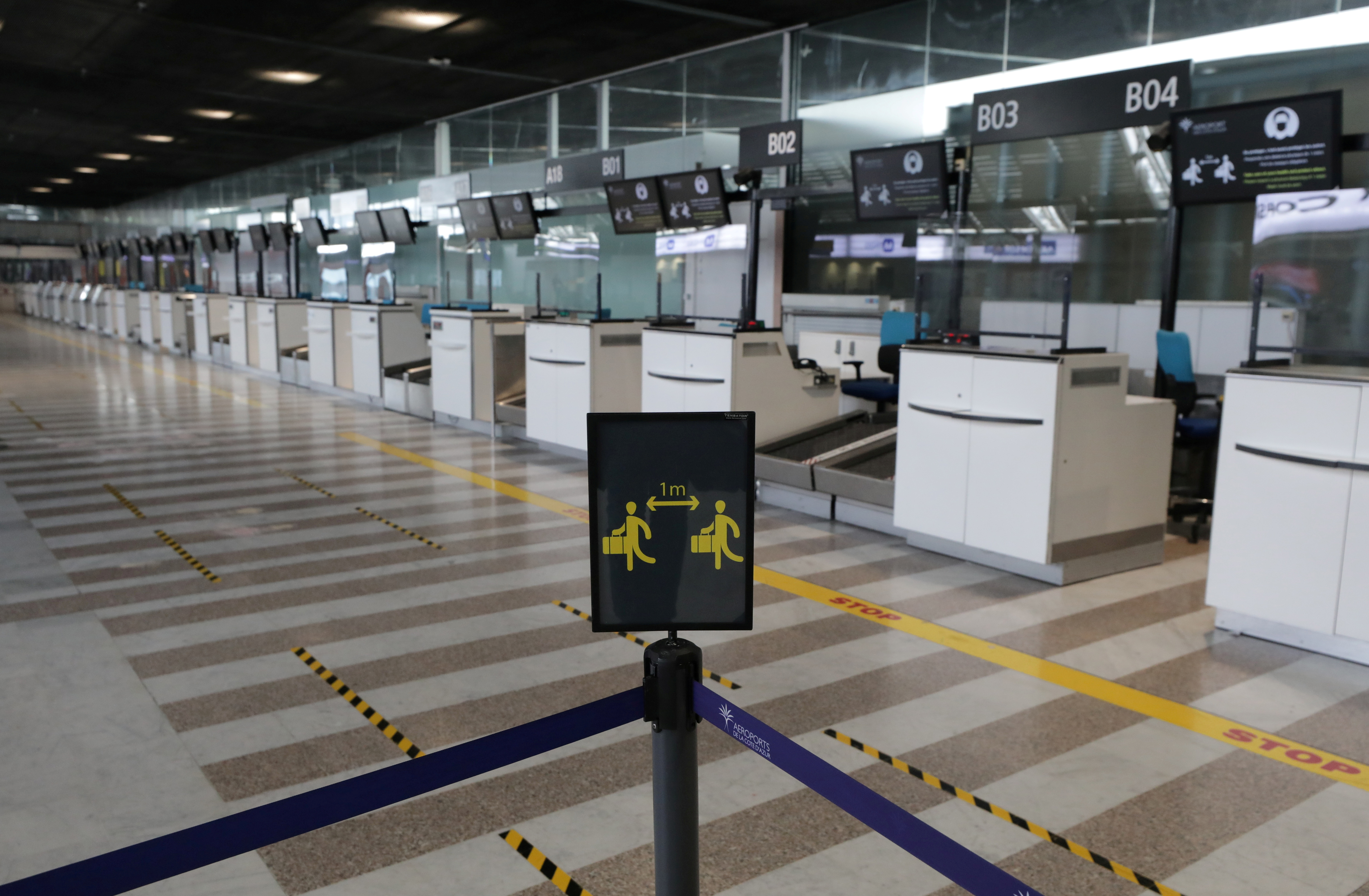
Sign up here.
Reporting by Sybille de La Hamaide; Editing by Catherine Evans
Our Standards: The Thomson Reuters Trust Principles. New Tab , opens new tab

World Chevron
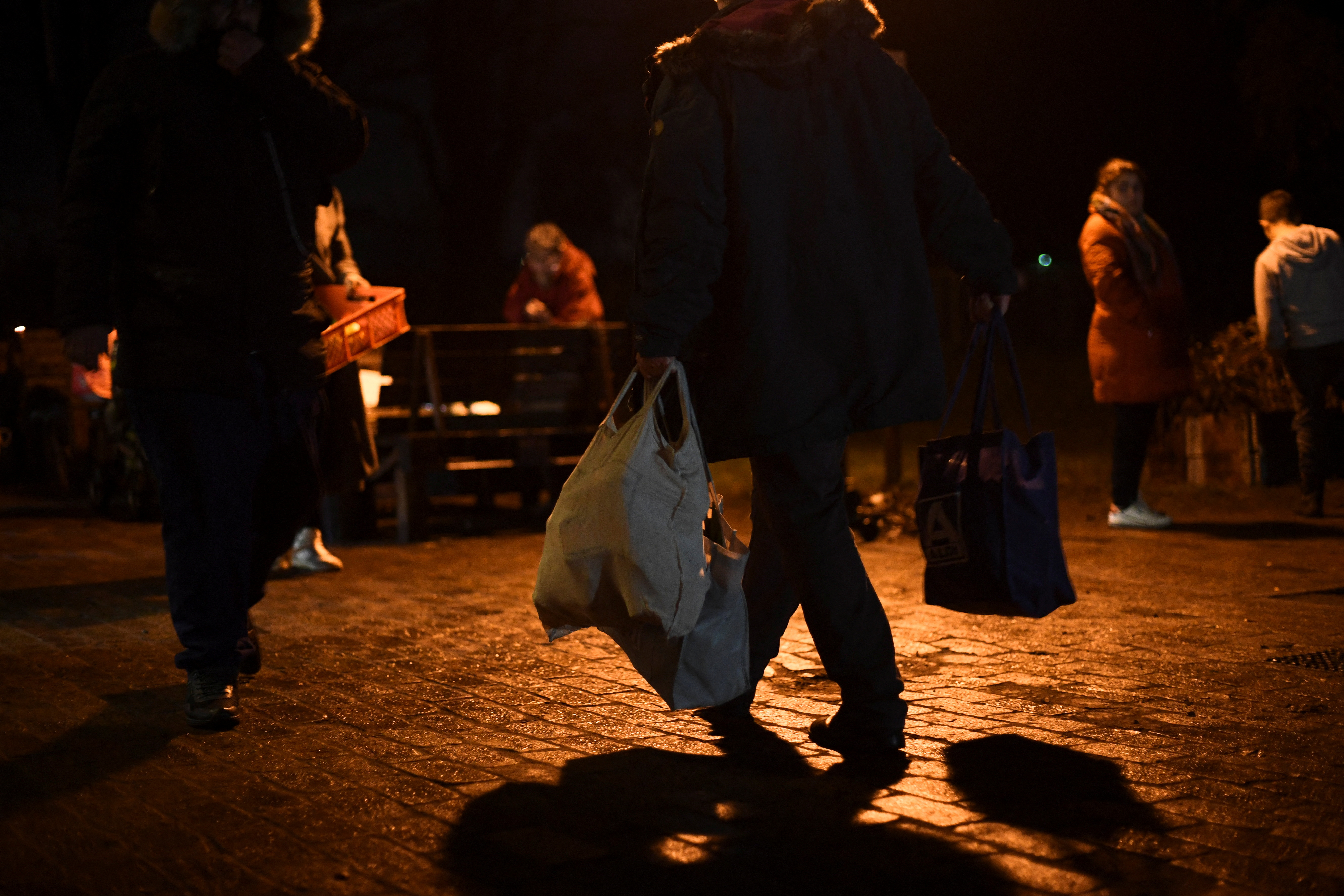
Germany's Lindner says planned income tax relief is not negotiable
German Finance Minister Christian Lindner said he would not bow to pressure from members of his government coalition to roll back his plans for billions of euros in personal income tax cuts to mitigate the creeping effects of inflation.

Consulate General of France in Washington Visa Section
Home > Discover France > Practical Infos > Health pass : what to know if you are traveling to France
- Bigger font
- Smaller font
Health pass : what to know if you are traveling to France
- print this page
As of March 14, 2022, the “vaccine pass” has been suspended in areas where it was required previously. Showing a valid health pass is still mandatory in order to enter health care facilities such as hospitals, retirement homes and places of care for disabled people. You will find more information about the health pass below and on the French Ministry of Health website.

What is the health pass ?
The health pass involves presentation in paper or digital format ( on the app TousAntiCovid ) of proof of negative Covid or vaccination status. Proof consists of one of the following items (only one is needed):
- A vaccine certificate, provided that the person is fully vaccinated ( booster dose included for the eligible who are over 18 years one month old.)
- The result of a positive RT-PCR or antigenic test proving the recovery from COVID-19. The test must be from more than 11 days and no more than 6 months ago.
- The result of a negative RT-PCR or antigenic test taken no more than 24 hours ago. Self-tests performed under the surveillance of a pharmacist are also accepted as a proof for the health pass in France. However, such proof is not accepted to cross any border between France and another country.
- A medical exemption from vaccination
Whom does this apply to ?
Individuals over the age of 12 are concerned by the health pass.
What proof is required to obtain a valid vaccine pass ?
What changes on February 15, 2022 ? Starting February 15, 2022, regulation regarding the pass will change for people aged 18 years and 1 month and older. The booster dose must be received between 3 months and 4 months after the end of the initial vaccination schedule. Until February 15, 2022, those with one of two doses in their initial vaccination schedule will be allowed to receive a temporary health pass, provided they receive their second dose within 4 weeks and present a negative test taken less than 24 hours ago.
Where is the health pass required ?
The health pass is required in the following circumstances:
- When entering health care centers, if you come to visit a relative or if you have a scheduled procedure.
- When crossing a border during a trip from/to France.
- In some overseas French territories where the use of the health or vaccine pass has been extended.
Click here to learn more about the rules regarding travel to France.
How to obtain a health pass in case of a vaccination abroad ?
Non-European Union nationals visiting France can obtain a health pass in France in pharmacies offering the certificate conversion service. Students enrolled in a French higher learning institution can apply for their pass here .
Non-European Union nationals (except students enrolled in a French higher learning institution, who can apply for their pass here ) need to provide the following documents:
- One of the 4 sanitary proofs aforementioned in paper format
Once you have gathered all these documents, the health pass can be obtained directly in a participating pharmacy. Please check the list of pharmacies already offering this service.
Which vaccination schedules are recognized in France? Do I need a booster to obtain the health pass ?
The initial vaccination schedule is considered complete:
- 28 days after one dose of the Janssen vaccine
- 7 days after the second dose for other vaccines recognized by the European Medicines Agency (EMA): Pfizer/Comirnaty, Moderna, AstraZeneca/Vaxzevria/Covishield
- For those who have received all the required doses of a vaccine authorized by the WHO which has not been recognized by the EMA: 7 days after one additional dose of a messenger RNA vaccine recognized by the EMA.
IMPORTANT: Starting February, 15, 2022, the booster dose must have been received within 4 months of the initial vaccine schedule in order to maintain a valid health pass. Please note that if you are eligible for the booster dose, your pass automatically expires 7 days after your deadline for receiving a booster.
How much does it cost to obtain the health pass ?
The amount charged for a health pass conversion cannot exceed 36 euros (incl. VAT).
How do I store my health pass ? The health pass can be stored indefinitely in the app “TousAntiCovid”, which must be presented in places and events subject to it. To import your pass, scan the QR code into the app once downloaded . It is also possible to take a picture of the health pass issued by a pharmacist in order to keep a digital copy ready.
Last modified on 30/06/2022
Also in this section
- Bringing your pet from the United States to France
- Metric System
Quick access
- Address, Hours and public holidays
France's travel rules have changed again as restrictions are dropped for UK visitors

Apr 1, 2022 • 4 min read

France has eased restrictions for UK visitors © Getty Images
France has lifted restrictions on unvaccinated travelers from the UK, which means that effective today passengers who haven't had the jab can visit without an essential reason.
The UK has been moved from the orange or mid-risk list to France's lower-risk green category in its international travel restrictions, making it significantly easier for UK travelers who haven't been vaccinated against COVID-19 to visit France.
The move puts the UK in line with countries such as the US and European Union nations who can travel to France with little fuss, presenting either proof of vaccination or, in the case of unvaccinated people, a negative test.
Previously visitors from the UK had to present a "compelling reason justifying the need for them to come to mainland France" which effectively banned them from visiting.
In recent weeks, France has relaxed other pandemic measures by suspending the vaccine pass requirement to enter indoor establishments and removing the mask mandate, with the exception of public transportation.
If you have your sights set on a trip to France this year, here's what you need to know about the rule changes and how they could impact your visit.

Do I need to show proof of vaccination to enter France?
Generally speaking, yes. If you want to avoid additional restrictions such as testing or quarantine, it's a good idea to show proof of vaccination.
To be considered fully vaccinated, you must have received a booster dose no later than nine months after receiving the last dose of your primary vaccine schedule if you're over 18. Those aged between 12 and 17 don't need to show proof of a booster to be considered fully vaccinated.
France accepts vaccines authorized by the European Union (EU) or those approved by the World Health Organization (WHO) for emergency use.
What are the entry rules for visiting France?
The documentation you need to enter France during the pandemic varies depending on where you are coming from.
If you're traveling from the EU or any country signed up to the EU digital COVID cert program , you can present your digital COVID-19 certificate or any approved European health certificate that documents your vaccination status to avoid additional restrictions. If you're unvaccinated, you'll need to take a negative test prior to departure.
If you're traveling from the UK, you can present a digital or paper NHS certificate showing their full vaccine status to avoid testing. If you're unvaccinated, you'll need to take a negative PCR or antigen test prior to departure.
If you're traveling from the US, the same rules apply. The US, like the UK, is now classified as a 'green' or low-risk country and passengers are asked to present their CDC vaccination cards. Unvaccinated arrivals must take a negative test prior to departure.
If you're traveling from elsewhere, you'll need to show proof of vaccination or a negative test if you're coming from a 'green' or low-risk country. If you're coming from an 'orange' or mid-risk country, you'll be asked to show proof of vaccination. Unvaccinated passengers from orange countries must present an essential reason for traveling.
Do you need a visa to go to France?

France suspends the health and vaccine pass
France required people, including tourists, to show a vaccine pass (pass vaccinal) or health pass ( pass sanitaire ) to board public transport and to enter most venues including museums, galleries, theaters, restaurants, and tourist attractions like the Eiffel Tower .
In mid-March the passes were suspended, which means you won't need one to enter an indoor facility unless you're visiting a nursing home facility. However, as they are 'suspended' rather than scrapped, the passes could be introduced again if cases spike or a new COVID-19 variant of concern emerges.
Where do I need to wear a mask in France?
Mask mandates have been lifted in most venues including shops, restaurants, gyms, museums and workplaces, but there are some exceptions. If you're traveling to France you'll need to wear a mask in airports and transport stations. You'll also need one to board public transport and taxis, including Uber. Failure to comply could result in a €135 fine.
France travel during COVID-19: What it felt like to visit this winter
Where can I get tested in France?
If you need to take a test for your return journey home, you shouldn't have much hassle finding one in France. Testing is widely available in France in most pharmacies and medical facilities but you'll generally need to make an appointment in advance. Most pharmacies can do antigen tests for about €25, and PCR tests can cost about €45. You can find testing locations near you through the COVID testing map .
You might also like: First-time France: where to go and what to do France’s 10 most stunning road trips The 12 best beaches in France
This article was first published Jul 21, 2021 and updated Apr 1, 2022.
Explore related stories

Tips & Advice
Jun 26, 2024 • 5 min read
How one writer skipped the road – and saw new corners of towns in Brittany by sticking to the train and bus.

Jun 20, 2024 • 6 min read

Jun 15, 2024 • 7 min read

Jun 14, 2024 • 7 min read

Jun 7, 2024 • 8 min read

May 30, 2024 • 6 min read

May 29, 2024 • 4 min read

May 24, 2024 • 9 min read

May 23, 2024 • 7 min read

May 18, 2024 • 7 min read
- Search Please fill out this field.
- Manage Your Subscription
- Give a Gift Subscription
- Newsletters
- Sweepstakes
A Country-by-country Guide to COVID-19 Entry Requirements in Europe
Everything you need to know for a safe and healthy trip to Europe.
:max_bytes(150000):strip_icc():format(webp)/alison-fox-author-pic-15f25761041b477aaf424ceca6618580.jpg)
When the COVID-19 pandemic first spread around the world, many countries shut their borders. In the years since, countries have opened, welcoming tourists with different vaccination or testing rules in place.
But many countries in Europe have since dropped travel-related restrictions, reverting back to pre-pandemic times and making it easier than ever to plan a trip.
Here, we've outlined every country in Europe and its current reopening status, including entry any requirements foreign travelers need to know.
Albania does not require U.S. travelers to show any COVID-19-related documents or tests, according to the U.S. Embassy in Albania .
To get to Andorra, visitors need to go through France or Spain, and therefore abide by the rules and regulations for those individual countries. Beyond that, there are no further entry requirements for coming to Andorra, according to the Andorra tourism site .
Austria is open to travel and there are no vaccination or testing requirements in place, according to the country’s official tourism site . In Vienna, masks must be worn on public transportation.
Belgium welcomes travelers from the U.S. and does not require them to show proof of vaccination, recovery, or a negative test, according to the U.S. Embassy in Belgium .
Bosnia and Herzegovina
Bosnia and Herzegovina welcomes U.S. travelers without any COVID-19-related travel restrictions, according to the U.S. Embassy in Bosnia and Herzegovina .
Bulgaria welcomes U.S. travelers without any COVID-19-related travel restrictions, according to the U.S. Embassy in Bulgaria .
Croatia welcomes U.S. travelers without any COVID-19-related travel restrictions, according to the Croatian National Tourist Board .
Cyprus has eliminated all COVID-19-related entry restrictions, according to the Deputy Ministry of Tourism . Masks remain mandatory on public transportation.
Czech Republic
The Czech Republic has eliminated all COVID-19-related entry restrictions, according to the Ministry of the Interior of the Czech Republic .
Denmark eliminated all of its COVID-19 entry and internal restrictions, according to the government’s COVID-19 website .
Estonia has eliminated all COVID-19-related rules, according to the government .
Finland has lifted all COVID-19-related entry rules, according to the Finnish government .
France has lifted all pandemic-related entry rules, according to the French government .
There are no longer any COVID-19-related entry rules for travel to Germany, according to the German Missions in the United States .
Greece has lifted all pandemic-era travel rules, according to the government . Greece has an optional Passenger Locator Form travelers can choose to fill out.
Hungary has lifted all COVID-19-related entry rules, according to the Hungarian Police .
Iceland welcomes travelers without any pandemic-era entry rules in place, according to Iceland’s COVID-19 website .
Ireland has removed all COVID-19-related entry rules for travel, according to the government .
Italy has lifted all COVID-19-related travel rules, according to the country's National Tourist Board .
Travelers entering Kosovo are not required to show proof of vaccination, according to the U.S. Embassy in Kosovo , but the embassy recommends travelers bring such proof. The country also doesn’t require pre-arrival testing, but the embassy said some airlines may.
Access to public institutions, malls, and indoor dining inside does require proof of vaccination or proof of a negative COVID-19 test for customers over 16.
Latvia has lifted all COVID-19-related travel rules, according to the Latvian tourism board .
Liechtenstein
Liechtenstein, a landlocked country, is accessible through Switzerland or Austria. Switzerland handles all immigration for Liechtenstein. COVID-19-related travel restrictions have been lifted in Liechtenstein, according to the European Union .
Lithuania no longer requires any pre-arrival testing or proof of vaccination to visit, according to the national tourism development agency .
Luxembourg welcomes travelers from all countries, regardless of their vaccination status, according to the U.S. Embassy in Luxembourg . Travelers do not need any pre-arrival COVID-19 tests.
Malta has eliminated all pandemic-related travel restrictions, according to the Malta Tourism Authority .
Moldova does not have any COVID-19-related entry restrictions in place for U.S. travelers, according to the U.S. Embassy in Moldova .
To get to Monaco, most visitors must travel through France. Monaco does not have any pandemic-related travel restrictions in place, according to the government .
Montenegro does not have any COVID-19-related entry rules in place, according to the U.S. Embassy in Montenegro . Face masks are required on public transportation, according to the country’s government .
Netherlands
The Netherlands has lifted COVID-19-related entry rules, according to the government .
North Macedonia
North Macedonia is open to American travelers who are not required to undergo any COVID-related entry requirements, according to the U.S. Embassy in North Macedonia .
Norway has discontinued all COVID-19-related entry restrictions, including pre-arrival testing, according to the government .
Poland has lifted all pandemic-era entry rules, including for vaccination and testing, according to the government .
Portugal, including the Azores and Madeira, no longer requires proof of vaccination or a negative test to enter, according to Visit Portugal .
Romania has lifted all pandemic-era entry rules, according to the government .
San Marino is a landlocked country surrounded by Italy. The country doesn’t have any specific COVID-19-related entry rules, according to the International Air Transport Association .
Serbia has removed all COVID-19-related entry restrictions, according to the U.S. Embassy in Serbia .
Slovakia has lifted all pandemic-related entry rules, according to Slovakia Travel . Travelers no longer have to show any proof of vaccination or tests to enter hotels, restaurants, or other venues.
Slovenia has eliminated pandemic-era travel restrictions, according to the government .
Spain has dropped all COVID-19-related health controls at entry points, according to the government , becoming one of the last European countries to do so. However, the country still asks that travelers from outside the European Union travel with either proof of vaccination administered within 270 days, proof of a negative PCR test taken within 72 hours of departure, proof of a negative rapid antigen test taken within 24 hours of departure, or proof they contracted COVID-19 and recovered within 180 days.
Sweden no longer has any COVID-19-related entry restrictions, according to the Public Health Agency of Sweden .
Switzerland
Switzerland has lifted all COVID-19-related entry rules, according to the Federal Office of Public Health .
Turkey is open to foreign travelers and does not have any COVID-19-related entry rules in place, according to the U.S. Embassy and Consulates in Turkey .
Visitors to Ukraine must show proof of either vaccination or proof of a negative COVID-19 test taken within 72 hours, according to the U.S. Embassy in Ukraine . Travelers must also have a health insurance policy to cover the potential costs of COVID-19 treatment.
The U.S. Department of State has currently issued a Level 4: Do Not Travel warning against visiting Ukraine due to the ongoing war and Russian invasion.
United Kingdom
The United Kingdom has dropped all COVID-19-related entry rules, according to the government .
Vatican City
Vatican City is the world's smallest country and is encircled by the Italian city of Rome. It is open to travelers who are able to enter Italy .
The information in this article reflects that of the publishing time above. However, as statistics and information regarding coronavirus rapidly change, some figures may be different from when this story was originally posted. While we strive to keep our content as up to date as possible, we also recommend visiting sites like the CDC or websites of local health departments.
:max_bytes(150000):strip_icc():format(webp)/Jamie-Aranoff-81160df91135499b952b796e76110d88.jpg)
Related Articles
We’re sorry, this site is currently experiencing technical difficulties. Please try again in a few moments. Exception: request blocked
Site under construction
clock This article was published more than 1 year ago
Everything you need to know about traveling to France

This story has been updated.
Every 30 minutes, Le Petit Train de Montmartre departs for a guided tour of Paris ’s 18th arrondissement. Cars full of passengers taking photos of the passing sights — the Sacré-Coeur Basilica, the Moulin Rouge, the neighborhood’s other famous windmill, Moulin de la Galette — are a sign of tourism’s return to France.
Ever since American visitors were allowed entry to France again in early June 2021, demand has increased accordingly, bringing back customers the travel industry sorely missed.
“We’re so grateful, it’s a huge relief,” says Meg Zimbeck, the founder and editor in chief of the restaurant-review website and food tour company Paris by Mouth. After resuming tours in summer 2021, Zimbeck had to hire more tour guides to keep up with record-breaking bookings.
With the influx of travelers come busy museums and long lines, so “be prepared for high season,” Zimbeck says.
If you are planning a trip to France, here’s more advice from travel experts on what you need to know before you go.
9 questions about traveling to Europe, answered
What restrictions remain for travelers
On Aug. 1, France ended its pandemic-era entry requirements . Visitors no longer need to provide proof of vaccination or a negative coronavirus test, according to the U.S. Embassy in France.
France ended its vaccine pass requirement in March and no longer requires proof of testing or vaccination in establishments such as bars, restaurants, museums and event spaces.
Mask mandates have also ended, including for trains, planes, airports and subways. Masks are still recommended in small enclosed spaces, for vulnerable groups at large gatherings and in hospitals.
If you feel more comfortable with a face covering, “nobody bats an eye if you choose to wear a mask,” Zimbeck says. “There’s no anti-mask sentiment.”
The country does recommend that travelers download the TousAntiCovid , a contact-tracing app, for their visit.
Europe travel is complicated. Take these 7 tips from travelers who just went.
How to dine and explore
If you have your heart set on visiting particular restaurants, museums, transportation and live events, or staying in certain hotels, “start making those reservations as soon as possible,” says Kate Schwab, a spokesperson for the French tourism authority, Atout France.
Catherine Hodoul-Baudry, head of sales and marketing for the hotel Le Bristol Paris , says the property is seeing a “big, big comeback” of American guests, with even more booking interest than in 2019. The hotel’s three-Michelin-starred restaurant, Épicure, is booked solid for the next two months.
Zimbeck says that while it has always been helpful to make restaurant reservations at popular places ahead of time, that is particularly true now.
“The restaurants are very small, and the ones that are in demand are booked up weeks in advance,” she says.
A local’s guide to Paris
Zimbeck says many restaurants launched online reservation systems during the pandemic, making it easier than ever for foreigners to snag reservations ahead of their trip.
For transportation within France, Victoire Spoerry, travel adviser at the Virtuoso agency Wellness by LMSV , urges travelers to make reservations for their rental car or high-speed train tickets as soon as they secure their flight. The earlier you book, the cheaper the ticket or rate, plus you will have more options.
Where to get a coronavirus test before returning home
While the testing requirement to return to the United States has been dropped, you may still want to test as your trip to France comes to a close.
Schwab says you can expect to pay between 25 and 44 euros depending on the kind of test you get. If you would rather get tested at the airport before your flight, you may need to make an appointment , and the fee may be more expensive.
“You can go to the pharmacy and get them there,” Schwab says. “It’s pretty easy. … With the antigen [test], I got the results in 15 minutes.”
The U.S. Embassy in France also offers advice on finding a coronavirus test abroad.
More travel tips
Vacation planning: Start with a strategy to maximize days off by taking PTO around holidays. Experts recommend taking multiple short trips for peak happiness . Want to take an ambitious trip? Here are 12 destinations to try this year — without crowds.
Cheap flights: Follow our best advice for scoring low airfare , including setting flight price alerts and subscribing to deal newsletters. If you’re set on an expensive getaway, here’s a plan to save up without straining your credit limit.
Airport chaos: We’ve got advice for every scenario , from canceled flights to lost luggage . Stuck at the rental car counter? These tips can speed up the process. And following these 52 rules of flying should make the experience better for everyone.
Expert advice: Our By The Way Concierge solves readers’ dilemmas , including whether it’s okay to ditch a partner at security, or what happens if you get caught flying with weed . Submit your question here . Or you could look to the gurus: Lonely Planet and Rick Steves .

Security Alert May 17, 2024
Worldwide caution, update may 10, 2024, information for u.s. citizens in the middle east.
- Travel Advisories |
- Contact Us |
- MyTravelGov |
Find U.S. Embassies & Consulates
Travel.state.gov, congressional liaison, special issuance agency, u.s. passports, international travel, intercountry adoption, international parental child abduction, records and authentications, popular links, travel advisories, mytravelgov, stay connected, legal resources, legal information, info for u.s. law enforcement, replace or certify documents.
Before You Go
Learn About Your Destination
While Abroad
Emergencies
Share this page:
Travel Advisory July 26, 2023
France - level 2: exercise increased caution.
Reissued with obsolete COVID-19 page links removed.
Exercise increased caution in France due to terrorism and civil unrest .
Country Summary: Terrorist groups continue plotting possible attacks in France. Terrorists may attack with little or no warning, targeting tourist locations, transportation hubs, markets/shopping malls, local government facilities, hotels, clubs, restaurants, places of worship, parks, major sporting and cultural events, educational institutions, airports, and other public areas.
Incidents such as pickpocketing and phone snatchings occur frequently and can happen anywhere, especially in crowded areas such as airports, train stations, subway and train cars, and near tourist attractions.
Peaceful demonstrations and strikes in Paris and other cities throughout France occur regularly and can disrupt transportation. On rare occasions, demonstrations have included violence and property damage and police have responded with water cannons and tear gas.
Read the country information page for additional information on travel to France.
If you decide to travel to France:
- Be aware of your surroundings when traveling to tourist locations and large crowded public venues.
- Avoid demonstrations and areas with significant police activity.
- Follow the instructions of local authorities including movement restrictions related to any ongoing police action.
- Find a safe location and shelter in place if unable to leave the vicinity of a demonstration.
- Monitor local media for breaking events and adjust your plans based on new information.
- Enroll in the Smart Traveler Enrollment Program ( STEP ) to receive Alerts and make it easier to locate you in an emergency.
- Follow the Department of State on Facebook and Twitter .
- Review the Country Security Report for France.
- Visit the CDC page for the latest Travel Health Information related to your travel.
- Prepare a contingency plan for emergency situations. Review the Traveler’s Checklist .
Embassy Messages
View Alerts and Messages Archive
Quick Facts
At least three months beyond date of departure from the Schengen area. The 12-page U.S. emergency passport is not valid for visa-free entry into France.
Must have at least one blank page for stamps
Not required for stays under 90 days
10,000 Euros Max
Embassies and Consulates
U.S. Embassy Paris 2 Avenue Gabriel 75008 Paris, France Telephone: +(33)(1) 43-12-22-22 Emergency After-Hours Telephone: +(33)(1) 43-12-22-22, enter zero “0” after the automated greeting Fax: +(33)(1) 42-61-61-40 (Special Consular Services) [email protected]
Only the consular sections in Paris and Marseille are authorized to issue passports. The other offices provide limited services to U.S. citizens.
U.S. Consulate General Marseille Place Varian Fry 13286 Marseille Cedex 6 France Telephone: +(33)(1) 43-12-22-22; ask for the consulate in Marseille Emergency After-Hours Telephone: +(33)(1) 43-12-22-22 [email protected]
U.S. Consulate General Strasbourg 15, Avenue d'Alsace 67082 Strasbourg Cedex France Telephone: +(33)(1) 43-12-48-80 Emergency After-Hours Telephone: +(33)(1) 43-12-22-22 Fax: (33)(3) 88-24-06-95 [email protected]
When calling from within France, drop the country code and add a zero. For example: +(33)(1) 43-12-22-22 becomes 01-43-12-22-22.
Please note that the emergency after-hours telephone number for all U.S. posts in France is: +(33)(1) 43-12-22-22 . Ask to speak to the duty officer if you need emergency assistance after business hours.
Destination Description
Learn about the U.S. relationship to countries around the world.
Entry, Exit and Visa Requirements
Visit the Embassy of France website for the most current visa and entry requirement information.
The Government of France does not recognize the 12-page U.S. emergency passport, issued by U.S. embassies and consulates overseas, as a valid travel document for visa-free entry into France. If traveling on this emergency passport, you may be refused boarding and/or entry by immigration officials and/or held at the airport until a return flight to the U.S. is available. Direct transit through France for another destination accepting an emergency passport may be permitted. You should check entry requirements of any other country of destination to make sure the emergency passport is accepted for entry.
You may enter the Schengen area, including France, for up to 90 days for tourist and business purposes without a visa.
Immigration officers may also request you show sufficient funds for your intended stay and a return airline ticket.
If you are traveling to France or Monaco for reasons other than business or tourism, such as employment (including diplomatic or official travel), study, or internship, you must obtain the appropriate French or Monegasque (Monaco) visa for that purpose before you leave the United States. You should be aware that it is nearly impossible to obtain or change visa status while in France.
All minors (under age 18) traveling without a parent or legal guardian and who are residents in France must have the written consent of at least one parent or legal guardian to leave France. The minor must travel with his or her own I.D., a copy of the parent/guardian’s I.D., and form number 15646*01, executed by the parent/guardian and available here .
If you are transiting through France to South Africa, there are special requirements for minors. See Entry, Exit and Visa Requirements for South Africa for additional information.
Contact the French Embassy in Washington at 4101 Reservoir Road NW, Washington, DC 20007, tel. (202) 944 6000, or one of the French Consulates General in Atlanta, Boston, Chicago, Houston, Los Angeles, Miami, New Orleans, New York, or San Francisco for the most current visa information.
Special Note: Overseas departments and territories of France (i.e. those not located in Europe) are not included in the Schengen Agreement. Please see Country Specific Information on French Guiana , French Polynesia , and the French West Indies for entry and exit requirements. For other departments and territories, visit the Embassy of France website for the most current visa and entry requirement information for those areas.
Monaco: For further information on entry requirements to Monaco, travelers may contact the Embassy of the Principality of Monaco , 888 17th Street NW, Suite 500, Washington D.C. 20006, Tel: (202) 234-1530, Email: [email protected] ; or the Consulate General of Monaco, 565 Fifth Avenue – 23rd floor, New York, NY 10017, Tel: (212) 286-0500, Email: [email protected] .
Traveling Through Europe : If you are planning to visit or travel through European countries, you should be familiar with the requirements of the Schengen Agreement.
- Your passport should be valid for at least three months beyond the period of stay if you plan on transiting a Schengen country. Please review our U.S. Travelers in Europe page. We recommend that your passport have at least six months’ validity remaining.
- You will need s ufficient proof of funds and a return plane ticket .
- For additional information about visas for the Schengen area, see the Schengen Visa page.
HIV/AIDS Restrictions: The U.S. Department of State is unaware of any HIV/AIDS entry restrictions for visitors to or foreign residents of France.
Find information about dual nationality , prevention of international child abduction and customs regulations on our websites.
Safety and Security
Terrorism: Terrorist groups and those inspired by such organizations are intent on attacking U.S. citizens abroad. Terrorists are increasingly using less sophisticated methods of attack – including knives, firearms, and vehicles – to more effectively target crowds. Frequently, their aim is unprotected or vulnerable targets, such as:
- High-profile public events (sporting contests, political rallies, demonstrations, holiday events, celebratory gatherings, etc.)
- Hotels, clubs, and restaurants frequented by tourists
- Places of worship
- Shopping malls and markets
- Public transportation systems (including subways, buses, trains, and scheduled commercial flights)
For more information, see our Terrorism page.
French authorities have spoken publicly about the heightened threat conditions for terrorist attacks in Europe.
A counterterrorism law enacted in 2017 allows the government to prevent the circulation of individuals and to create zones of protection and security.
The French government has temporarily reestablished border controls at its borders with its Schengen neighbors and movement may be restricted in some areas. Border controls with the United Kingdom, including the Channel Tunnel crossing, have also been reestablished following Brexit.
The Government of France routinely conducts security and crisis management drills involving deployment of security forces, emergency services, and police to high profile areas that may be near popular tourist sites. U.S. citizens should be aware of the possibility of drills and should heed instructions of local authorities should they encounter them.
French police and military routinely patrol public spaces. You should expect security inspections (to include purses, bags, and backpacks) at the entrance to large public venues and businesses.
When traveling or living in France, you should:
- Be aware of your local security situation and take appropriate steps to bolster your personal security.
- Monitor media and local information sources like France24 , Radio France International , The Local , and the Paris Travel Information webpage and factor updated information into personal travel plans and activities.
- Address specific safety concerns to French law enforcement authorities who have responsibility for the safety and security of all residents and visitors to France.
- Enroll in the Smart Traveler Enrollment Program ( STEP ) to receive Alerts and make it easier to locate you in an emergency.
Crime: The majority of crimes directed against foreign visitors, including U.S. citizens, involve pick-pocketing (passports, phones, cash, credit cards), vehicle and residential break-ins, bicycle theft, and other forms of theft.
Visitors to congested and popular tourist areas (e.g., museums, monuments, train stations, airports, and subways) should be particularly attentive to their surroundings. Rental cars are frequently targeted for break-ins when visitors exit their vehicles and leave valuables behind.
Crimes of opportunity are more likely to involve violence on the street late at night or when the victim resists.
Exercise extra caution when out alone at night and/or consider traveling out at night with trusted companions.
While the incidence of sexual assault is statistically low, attacks do occur.
Be aware of “date-rape” drugs, which are present in France. The Embassy has assisted multiple victims who appear to have been targeted using these drugs.
Be cautious in bars and clubs where alcohol is served, and do not leave your drink unattended or accept a drink from strangers, as they may have slipped drugs into the drink.
There are high incidences of “smash and grab” robberies in economically depressed areas or on highly traveled thoroughfares such as roads to and from the airport. Thieves on foot or motorcycle will approach a vehicle that is stopped in traffic, smash a window, reach into the vehicle to grab a purse or other valuable item, and then flee. Keep doors locked and valuables out of sight.
See our travel tips for Women Travelers .
Demonstrations occur frequently. They may take place in response to political or economic issues, on politically significant holidays, and during international events.
- Demonstrations can be unpredictable, avoid areas around protests and demonstrations.
- Past demonstrations have turned violent.
- Check local media for updates and traffic advisories.
- Strikes can interfere with travel plans and increase expenses of traveling to France.
Demonstration organizers must obtain prior police approval, and police routinely oversee participants. In case of violence or property damage, French authorities may use chemical agents and water cannons to disperse crowds.
Alerts issued regarding demonstrations are posted on the U.S. Mission’s website .
International Financial Scams: See the Department of State and the FBI pages for information.
Victims of Crime: Report crimes to the local police by dialing 112 (the European emergency number which has some English-speaking staff) or 17 from a landline or cell phone and contact the U.S. Embassy Paris at +(33)(1) 43-12-22-22. French authorities do not generally speak English and communication may be difficult. Remember that local authorities are responsible for investigating and prosecuting crime.
See our webpage on help for U.S. victims of crime overseas .
- help you find appropriate medical care
- assist you in reporting a crime to the police
- contact relatives or friends with your written consent
- provide general information regarding the victim’s role during the local investigation and following its conclusion
- provide a list of local attorneys
- provide information on victim’s compensation programs in the U.S.
- provide the Paris Police Prefecture pamphlet in English
- provide an emergency loan for repatriation to the United States and/or limited medical support in cases of destitution
- help you find accommodation and arrange flights home
- replace a stolen or lost passport .
- provide you with information regarding victims’ assistance groups in France
Domestic Violence: U.S. citizen victims of domestic violence are encouraged to contact the Embassy for assistance.
Tourism: The tourism industry is generally regulated and rules with regard to best practices and safety inspections are regularly enforced. Hazardous areas/activities are identified with appropriate signage and professional staff is typically on hand in support of organized activities. In the event of an injury, appropriate medical treatment is widely available throughout the country. Outside of a major metropolitan center, it may take more time for first responders and medical professionals to stabilize a patient and provide life-saving assistance. U.S. citizens are encouraged to purchase medical evacuation insurance .
Local Laws & Special Circumstances
Criminal Penalties: You are subject to local laws. If you violate local laws, even unknowingly, you may be expelled, arrested, or imprisoned. Individuals establishing a business or practicing a profession that requires additional permits or licensing should seek information from the competent local authorities, prior to practicing or operating a business.
Furthermore, some laws are also prosecutable in the U.S., regardless of local law. For examples, see our website on crimes against minors abroad and the Department of Justice website.
Arrest Notification: If you are arrested or detained, ask police or prison officials to notify the U.S. Embassy immediately. French authorities will not routinely notify the Embassy unless you request them to do so. See our webpage for further information.
Penalties for possessing, using, or trafficking in illegal drugs in France are severe.
Convicted offenders can expect long jail sentences and heavy fines.
In France and Monaco, driving under the influence of drugs or alcohol could land you immediately in jail.
Flying Drones: The use of drones and drone footage in France is highly regulated. It is against the law in France to operate drones over public spaces (including museums, parks, streets) in urban areas and near airports, military bases, prisons, nuclear plants, and large gatherings such as outdoor concerts and parades. The privacy of individuals captured in drone footage is paramount. Violators can be arrested and subject to fines of up to 75,000 euros and/or one-year imprisonment. Review the information sheet provided by the French government concerning hobbyist drone flights.
You should contact the Embassy of France or one of France's consulates in the United States for specific information regarding customs requirements. Please see our Customs Information .
There are strict regulations concerning temporary importation or exportation from France of items such as firearms, antiquities, medications, business equipment, merchandise samples, and other items.
French Foreign Legion: U.S. citizens interested in joining the French Foreign Legion (FFL) should be aware that the cognitive and physical tests for acceptance are extremely challenging.
Ensure you have access to sufficient funds to return home should your candidature be refused.
Successful candidates report that the FFL provides a new identity and retains their U.S. passport during a long probation period. Lack of access to your passport can complicate routine or emergency travel.
Faith-Based Travelers: See our following webpages for details:
Faith-Based Travel Information
International Religious Freedom Report – see country reports
Human Rights Report – see country reports
Hajj Fact Sheet for Travelers
Best Practices for Volunteering Abroad
LGBTI Travelers: There are no legal restrictions on same-sex sexual relations or the organization of LGBTQI+ events in France.
See our LGBTQI+ travel information page and section 6 of the Department of State's Human Rights report for further details.
Travelers with Disabilities: The law in France prohibits discrimination against persons with physical, sensory, intellectual or mental disabilities, and the law is enforced. Social acceptance of persons with disabilities in public is as prevalent as in the United States. Expect accessibility to be limited in public transportation and general infrastructure.
Visitors to France should expect accessibility to be limited in public transportation (subway, specifically), lodging, communication/information, and general infrastructure. Getting around French cities can be challenging for those with mobility issues. Many sidewalks are narrow and uneven, and cobblestone streets make access difficult, though major tourist sites generally have better facilities.
Although the Paris Metro is a very efficient method for traveling throughout central Paris, most stations are not readily accessible for people with disabilities. However, many Parisian buses and tramways are equipped with lowering platforms for travelers with limited-mobility, or sight- or hearing-disabled. Taxis are also a good mode of transportation.
The English-language Paris Visitors Bureau and Explore France websites contains additional information specifically designed for travelers with special mobility needs. For further information, e-mail U.S. Embassy Paris , U.S. Consulate General Marseille , or U.S. Consulate General Strasbourg .
Students: See our Students Abroad page and FBI travel tips .
Women Travelers: See our travel tips for Women Travelers .
Dial 15 to connect to emergency medical services or dial 112 to reach an operator.
Ambulance services are widely available, though English is not widely spoken.
Medical care is comparable to that found in the United States.
Except for emergency services, you may be required to pay for service prior to receiving treatment in France. Be sure to obtain a “Feuille de Soins” for later reimbursement from your health care provider.
You may be refused routine care under local law if you lack the ability to pay.
Foreigners with terminal illnesses may be denied treatment if treatment is available in their home country.
We do not pay medical bills. Be aware that U.S. Medicare/Medicaid does not apply overseas. Most hospitals and doctors overseas do not accept U.S. health insurance. Hospital bills are not itemized.
Medical Insurance: Make sure your health insurance plan provides coverage overseas. Most care providers overseas only accept cash payments. See our webpage for more information on insurance coverage overseas. Visit the U.S. Centers for Disease Control and Prevention for more information on the type of insurance you should consider before you travel overseas.
We strongly recommend supplemental insurance to cover medical evacuation.
Always carry your prescription medication in original packaging with your doctor’s prescription. Check with the government of France to ensure the medication is legal in France.
Vaccinations: Be up-to-date on all vaccinations recommended by the U.S. Centers for Disease Control and Prevention.
Further health information:
- World Health Organization
- U.S. Centers for Disease Control and Prevention (CDC)
Air Quality: Visit AirNow Department of State for information on air quality at U.S. Embassies and Consulates.
The U.S. Embassy maintains a list of doctors and hospitals . We do not endorse or recommend any specific medical provider or clinic.
Travel and Transportation
Road Conditions and Safety: Roads are generally comparable to those in the United States, but traffic engineering and driving habits pose special dangers.
Lane markings and sign placements may not be clear. Drivers should be prepared to make last-minute maneuvers.
Right-of-way rules differ from those in the United States. Unless specifically indicated otherwise, drivers entering intersections from the right have priority over those on the left, even when entering relatively large boulevards from small side streets.
Bicycles, motorcycles, scooters, and electric skateboards are prevalent on streets, crosswalks and sometimes sidewalks. They have legal priority and often do not respect traffic signals.
On major highways, there are service stations at least every 25 miles. Service stations are not as common on secondary roads in France as they are in the United States.
Highway toll stations may not accept U.S. credit cards. For non-residents, the simplest way to pay is with cash euros at the toll lane marked for that purpose. Do not attempt to use a credit card if it is the only one you have in your possession in case the machine does not return your card.
Traffic Laws: While French cities actively encourage bicycle rentals through widely available city-sponsored systems, you should be cautious, especially in a busy and unfamiliar urban environment. Helmets are neither required nor readily available near rental stations. If you plan to ride a bicycle in France, you should bring your own helmet. Though bicycles, scooters and electric skateboards must follow local traffic laws, or risk fines, they often do not do so and can pose a danger to drivers and pedestrians. Many paths are clearly marked for this form of transportation in larger cities.
Pedestrian accidents occur when a pedestrian steps out into the street, often when a car or motorcycle is making a turn through a pedestrian crosswalk. Pedestrians should be cautious and aware of traffic even when they have a green walking signal since this is no guarantee against aggressive drivers. Do not assume cars will stop for pedestrians in a crosswalk.
Public Transportation: Paris has an extensive and efficient public transportation system. The interconnecting system of buses, subways, and commuter rails is comparable to or better than that found in major U.S. cities. Similar transportation systems are found in all major French cities.
If you use any of France’s public transportation services, take particular care to retain your used or “validated” ticket until you exit the bus, subway, or train station completely, as it may be checked or required for exit. Children over four years of age must have a ticket.
Inspectors conduct intermittent, random checks and passengers who fail to present the correct validated ticket are subject to stiff and immediate fines. Failing to sign and date or enclose photo (when required) on a tourist pass (Paris Visite) makes the pass invalid and the holder subject to a fine.
Inspectors may show no interest in explanations and no sympathy for an honest mistake. Failure to cooperate with inspectors may result in arrest.
Between cities, France has extensive rail service, which is safe and reliable. High-speed rail connects the major cities in France. Many cities are also served by frequent air service. Traveling by train is safer than driving.
See our road safety page for more information. Visit the website of the French National Tourist Office for specific information on French driver's permits, vehicle inspection, road tax, and mandatory insurance. See Embassy of France’s driving in France webpage for information on using U.S. driver’s licenses in France.
Aviation Safety Oversight: The U.S. Federal Aviation Administration (FAA) has assessed the government of France’s Civil Aviation Authority as being in compliance with International Civil Aviation Organization (ICAO) aviation safety standards for oversight of France’s air carrier operations. Further information may be found on the FAA’s safety assessment page .
Maritime Travel: Mariners planning travel to France should also check for U.S. maritime advisories and alerts . Information may also be posted to the U.S. Coast Guard homeport website , and the NGA broadcast warnings website (select “broadcast warnings.”)
For additional travel information
- Enroll in the Smart Traveler Enrollment Program (STEP) to receive security messages and make it easier to locate you in an emergency.
- Call us in Washington, D.C. at 1-888-407-4747 (toll-free in the United States and Canada) or 1-202-501-4444 (from all other countries) from 8:00 a.m. to 8:00 p.m., Eastern Standard Time, Monday through Friday (except U.S. federal holidays).
- See the State Department’s travel website for the Worldwide Caution and Travel Advisories .
- Follow us on Twitter and Facebook .
- See traveling safely abroad for useful travel tips.
- Paris 2024 Olympics and Paralympics
Review information about International Parental Child Abduction in France . For additional IPCA-related information, please see the International Child Abduction Prevention and Return Act ( ICAPRA ) report.
Travel Advisory Levels
Assistance for u.s. citizens, learn about your destination, enroll in step.

Subscribe to get up-to-date safety and security information and help us reach you in an emergency abroad.
Recommended Web Browsers: Microsoft Edge or Google Chrome.
Check passport expiration dates carefully for all travelers! Children’s passports are issued for 5 years, adult passports for 10 years.
Afghanistan
Antigua and Barbuda
Bonaire, Sint Eustatius, and Saba
Bosnia and Herzegovina
British Virgin Islands
Burkina Faso
Burma (Myanmar)
Cayman Islands
Central African Republic
Cote d Ivoire
Curaçao
Czech Republic
Democratic Republic of the Congo
Dominican Republic
El Salvador
Equatorial Guinea
Eswatini (Swaziland)
Falkland Islands
France (includes Monaco)
French Guiana
French Polynesia
French West Indies
Guadeloupe, Martinique, Saint Martin, and Saint Barthélemy (French West Indies)
Guinea-Bissau
Isle of Man
Israel, The West Bank and Gaza
Liechtenstein
Marshall Islands
Netherlands
New Caledonia
New Zealand
North Korea (Democratic People's Republic of Korea)
Papua New Guinea
Philippines
Republic of North Macedonia
Republic of the Congo
Saint Kitts and Nevis
Saint Lucia
Saint Vincent and the Grenadines
Sao Tome and Principe
Saudi Arabia
Sierra Leone
Sint Maarten
Solomon Islands
South Africa
South Korea
South Sudan
Switzerland
The Bahamas
Timor-Leste
Trinidad and Tobago
Turkmenistan
Turks and Caicos Islands
United Arab Emirates
United Kingdom
Vatican City (Holy See)
External Link
You are about to leave travel.state.gov for an external website that is not maintained by the U.S. Department of State.
Links to external websites are provided as a convenience and should not be construed as an endorsement by the U.S. Department of State of the views or products contained therein. If you wish to remain on travel.state.gov, click the "cancel" message.
You are about to visit:
Etiquette 101: Do You Pass as a Parisian? Or Are You Just Another Emily in Paris?
Are the waiters in Paris actually rude, or are you the problem? Parisians weigh in on how to not be that American tourist this summer.

Every item on this page was chosen by a Town & Country editor. We may earn commission on some of the items you choose to buy.
On the cover our summer issue, which focused entirely on Paris–a love note to the city that will experience the storm of couture week, men's fashion week, the Olympics , and a nail-biting election all in one summer– liberte , egalite , and scandale are emblazoned in red. Heading to Paris this summer? We've asked Parisians and other Francophones for a few tips on how to avoid the last word in the aforementioned trio.
What is the Paris Syndrome?
"There are so many videos online about 'how to dress French'," Joost Van Der Ree, a Paris-based fashion photographer tells T&C . "Tourists often try too hard, hunting for misguided tutorials on how to dress like a Parisian. True Parisian style is being original and yourself. Have some humor with it and put the beret down." It's like someone rolling up to Raoul's downtown in a look from Bass Pros Shop.
Ce Quoi... Oat Milk?
Comedian Andy Haynes once said, "I ordered oat milk in Paris and the waiter said no," and the TikTok skit below illustrates the situation. While trendy Parisian cafes like Coutume Cafe , Bonjour Jacob , and Le Peleton Cafe have alternative milk options, it might be more difficult to find them at traditional brasseries. Asking for it isn't so much of an etiquette issue, just a very American behavior.
Save Athleisure for Los Angeles
"It's not sexy, not chic," fashion designer Steven Passaro tells T&C . "Gym clothes should only be worn at the gym." According to him, you won't fit in with the locals if you're seen out and about wearing your Lululemons. But, those who are keeping up with their fitness shouldn't worry. He says running up and down the Seine or wearing athleisure at the sports club La Montgolfiere (rumored to be the go-to gym for designer Simon Porte of Jacquemus) is of course okay.
No, Not Everyone Needs to Hear Your Conversation
It was a quiet morning in the lobby of the Bulgari Hotel Paris during couture week in January. The sun was slowly peaking through the cloudy haze and the smell of fresh espresso wafted through the air. Suddenly: a thunderous voice with a distinctly American accent belted from across the room. "Parisians talk very low," Sofia Achaval de Montaigu, a Parisian-Argentinian socialite and founder of clothing brand Acheval Pampa , tells T&C . "It's like a city with no noise. When you are out at a restaurant or cafe, you always notice when Americans are around because they talk very loudly."
And, Let's Not Talk About Work
Unlike Americans, the French are pretty serious about their work-life balance and there's nothing more crass than talking business after 5 p.m. In fact, it's a pretty big faux pas to lead a conversation with "What do you do for work?" Try instead: a conversation about a new art exhibition. Extra points if the exhibit is at a lesser-known museum .
Is Duo Lingo Enough?
Who knows, but it's a start. This is a given regardless of your destination: try to speak the language of the place you are visiting. A simple "Bonjour Monsieur/Madame" can go a long way, even if the person you speak to replies in English. When I first started going to Le Comptoir de Saint Peres (an unpretentious cafe on the left bank where a few fashion big names frequent), they didn't receive my butchered French well. But, after a month or so, they let me stay at my table during lunch rush hour. The two English-only speakers next to me were booted out. It felt like being back in middle school when the mean girl was finally nice to you: the ultimate approval.
Coffee is a Luxurious Ritual, Not a Rushed Necessity
I have never felt more American (and out of place in a European country) than when I took an espresso to go early on in my cliche Hemingway-esque life in Paris. "The whole take-out coffee thing, for sure," Achavel de Montaigue says when asked what sets Americans apart. "Parisians are all about having coffee in cafes. There is a ritual around it, and having a moment to stop and have coffee is important to us."
Style News Editor at Town and Country covering society, style, art, and design.

@media(min-width: 40.625rem){.css-1jdielu:before{margin:0.625rem 0.625rem 0;width:3.5rem;-webkit-filter:invert(17%) sepia(72%) saturate(710%) hue-rotate(181deg) brightness(97%) contrast(97%);filter:invert(17%) sepia(72%) saturate(710%) hue-rotate(181deg) brightness(97%) contrast(97%);height:1.5rem;content:'';display:inline-block;-webkit-transform:scale(-1, 1);-moz-transform:scale(-1, 1);-ms-transform:scale(-1, 1);transform:scale(-1, 1);background-repeat:no-repeat;}.loaded .css-1jdielu:before{background-image:url(/_assets/design-tokens/townandcountrymag/static/images/diamond-header-design-element.80fb60e.svg);}}@media(min-width: 64rem){.css-1jdielu:before{margin:0 0.625rem 0.25rem;}} Etiquette @media(min-width: 40.625rem){.css-128xfoy:before{margin:0.625rem 0.625rem 0;width:3.5rem;-webkit-filter:invert(17%) sepia(72%) saturate(710%) hue-rotate(181deg) brightness(97%) contrast(97%);filter:invert(17%) sepia(72%) saturate(710%) hue-rotate(181deg) brightness(97%) contrast(97%);height:1.5rem;content:'';display:inline-block;background-repeat:no-repeat;}.loaded .css-128xfoy:before{background-image:url(/_assets/design-tokens/townandcountrymag/static/images/diamond-header-design-element.80fb60e.svg);}}@media(min-width: 64rem){.css-128xfoy:before{margin:0 0.625rem 0.25rem;}}

Common Courtesy: Nicola Coughlan & Luke Newton

Yes, Serving Food Buffet-Style Can be Chic.

26 Thoughtful Passover Gifts for Your 2024 Seder

Truman Capote and the Lessons of Etiquette
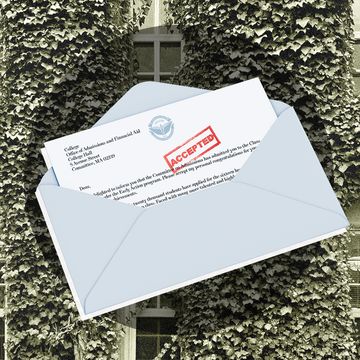
Etiquette 101: Sharing College Acceptance News
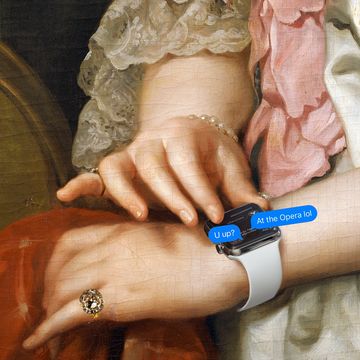
Faux Pas? Moi?

Tips For Giving Wine? Don't Be Boring

How to Behave at a Dinner Party on Ozempic

How to Set the Table Right, Once and For All
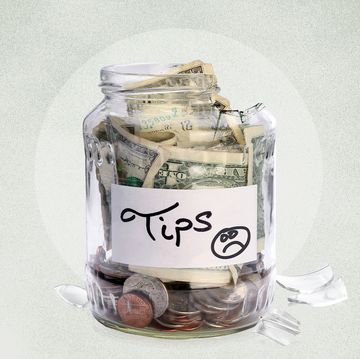
The Tipping Omertà
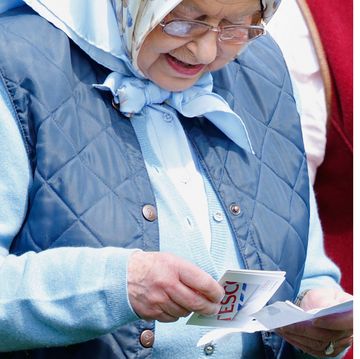
To Give or Not to Give a Gift Card
Paris seeing signs of 'healthy' travel demand ahead of Summer Olympics — but plenty of deals remain
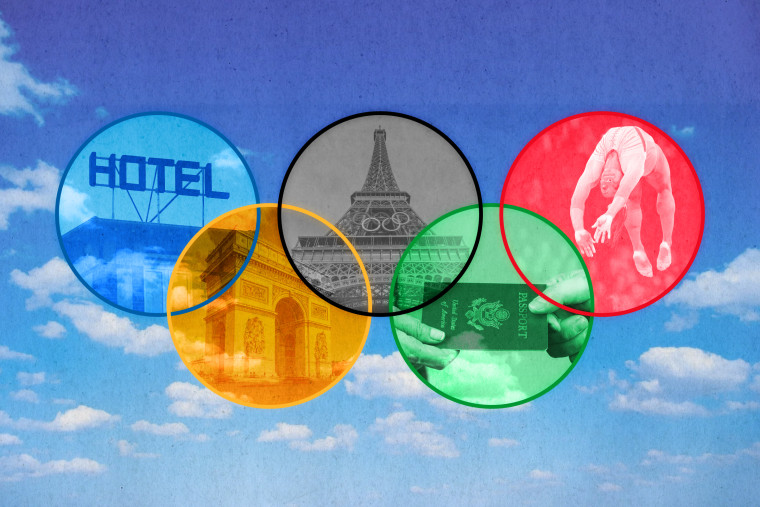
The Summary:
- The 2024 Summer Olympics in Paris are right around the corner, but if you're looking to travel there, it may not be too late to find a deal.
The government in Paris is spending an estimated $9.7 billion on preparation for the Games, with hopes for 15 million visitors between late July and early September.
Airfares tracked by digital booking site Hopper show flights to Paris from the U.S. during the weekend of the opening ceremony averaging about $877 per ticket.
The 2024 Summer Olympics in Paris are set to see plenty of attendees — but travel data shows there are still opportunities for last-minute deal-hunters to capitalize on current market dynamics.
Roughly a month out from the Friday, July 26, torch-lighting ceremony that will kick off the games, more than 75% of Paris-area rooms tracked by analytics firm CoStar have been booked over the Games’ opening weekend. That compares with approximately 42% occupancy over the same weekend in 2023.
“Three out of four rooms is certainly a healthy performance,” said Jan Freitag, national director for hospitality market analytics at CoStar.
Freitag said occupancy would likely only increase as the Games approach, especially as people — primarily those in Europe who can make the trip by car or train — decide at the last minute that they want to attend. There hasn’t been a Summer Olympics played on the European continent since the Athens Games in 2004.
Unprecedented security and cleanup efforts have been undertaken, including a plan to prep the Seine river for competition — an effort highlighted by President Emmanuel Macron personally with a promise to take a dip in the water.
But nothing is guaranteed, and some would-be visitors to the City of Lights might be just as inclined to forgo the trip to avoid crowds, Freitag said.
“It’s a very, very special event — but it will be interesting to see how this number pans out compared to other Augusts in prior years,” he said. “There are always people who are staying away from these events too.”
Other travel sites showed a plethora of hotel deals still available — with at least one 3-star hotel in the heart of Paris showing 50% off usual rates for high summer, according to Google.
That is down 27% compared with the same period last year — but Hopper economist Hayley Berg said that largely reflects a step-down from the sky-high prices seen during the post-pandemic “revenge travel” surge that continued into 2023, along with greater seating capacity being offered by air carriers.
“This rebalancing of supply and demand, combined with the outliers of 2023 prices, mean that airfare this summer to Paris costs less than last year, even with the Olympics ahead,” Berg wrote in a statement.
“We expect that as Olympic trials complete and the Games grow closer, prices will surge as flights begin to sell out on specific travel dates,” Berg added.
In fact, bookings on the Hopper app for trips to Paris around the Olympic Games dates have doubled compared with last year at this time.
A French tourism minister recently said international flight arrivals to Paris were already up 24% for the period covering the Summer Games.
U.S. airfares in May were down 16% from last year, according to the latest reading from the c onsumer p rice i ndex — and overall, fares have returned to prepandemic levels.
But for would-be travelers with middle to lower incomes, Freitag said, a trip to Paris this summer is likely out of the question.
“The headline is bifurcation,” he said. “For the very high and high end, there’s still a lot of interest and money for high-end leisure and staying in upscale accommodations.”
But households making less than $75,000 annually or so “are feeling the pinch of higher inflation rates,” Freitag said. While the inflation rate has come down significantly from its peak in the summer of 2022 , it still hovers just above the Federal Reserve’s desired 2% mark.
“In the basket of things that you have to buy versus want to buy, have-to-buy items like car insurance are now so much more expensive versus want-to-buy like weekend trips,” he said. “So we are seeing a deceleration of that demand, especially for midscale-type properties.”
French officials have cautioned that while the boost from tourism should be substantial — more than $1 billion using the most conservative assumptions — it could take a year or longer to tabulate the true impact.
And historically, the ultimate economic effect for Olympic host cities has been mixed. A Council on Foreign Relations report note s that while the 1992 Summer Games in Barcelona are often cited as a tourism success story, there has been roughly an even split between cities that have seen some payoff from hosting the Olympics and those that haven’t.
Rob Wile is a breaking business news reporter for NBC News Digital.

IMAGES
COMMENTS
Alison Fox. Published on March 14, 2022. France is easing border restrictions for American tourists, according to government officials, while simultaneously eliminating COVID-19-related vaccine ...
Your Covid-19 questions answered. French people who are living abroad, travelling or returning from abroad, as well as visitors from abroad, will find answers below to frequently asked questions on COVID-19 measures. This FAQ supplements the information on the Conseils aux voyageurs (Travel advice, in French only) section.
Unvaccinated Americans can now travel to France without seeking special permission. The United States gets a 'green' light from a European destination that just dropped its mask mandate.
France. The 2024 Summer Olympics will take place in Paris, France, from July 26-August 11, 2024. The Paralympic Games is scheduled for August 28-September 8, 2024. Crowds are expected at these events, and mass gatherings are associated with unique health risks. If you plan to travel to Paris for these events, visit a travel health specialist at ...
Unvaccinated travelers from orange countries are no longer allowed to visit France for non-essential travel. Those with pressing reasons for travel must provide a negative PCR or antigen test taken within 72 and 48 hours of boarding your flight, respectively. Additionally, self-isolation for seven days is mandatory.
Find continuously updated travel restrictions for France such as border, vaccination, COVID-19 testing, and quarantine requirements. Flights. Hotels. Cars. Packages. Travel Guides. Trains. Vacation Rentals. ... Unvaccinated visitors from the United States can enter France without restrictions.
Who can go. As of August 1, there are no Covid-19 related travel restrictions for France. This means travelers are no longer required to present proof of vaccination, complete a sworn statement ...
Under France's rules, unvaccinated travelers from either country will still be allowed in provided they have an essential reason for travel, however they'll need a negative Covid-19 test ...
This site is developed by Atout France, the national tourism operator under the supervision of the Ministry of Europe and Foreign Affairs. (Update: July 2023) With more than 90 million foreign visitors recorded in 2018 (including overseas destinations), France remains the world's leading tourist (…)
Unvaccinated passengers coming from green countries are required to present a negative lab-produced antigen or PCR COVID-19 test within 48 hours of traveling to France. Unvcaccinated travelers coming from an amber or red country, including the UK and the US, are banned from non-essential travel to France. All travelers are required to provide a ...
Following the measures announced by the government on 29 January 2021: Travellers to or from a destination outside the European space. As of Sunday, 31 January 2021, all travel to France or from France to any country outside the European space (European Union Member States, Andorra, the Holy See, Iceland, Liechtenstein, Monaco, Norway, San Marino and Switzerland) will be denied, with the ...
Your passport must be: issued less than 10 years before the date you enter the country (check the 'date of issue') valid for at least 3 months after the day you plan to leave (check the ...
PARIS, July 17 (Reuters) - France will reinforce restrictions on unvaccinated travellers from a series of countries to counter a rebound in COVID-19 infections, while opening its doors to those ...
As of March 14, 2022, the "vaccine pass" has been suspended in areas where it was required previously. Showing a valid health pass is still mandatory in order to enter health care facilities such as hospitals, retirement homes and places of care for disabled people. You will find more information about the health pass below and on the ...
From 23:00 GMT on 13 February children aged 12-17 do not need to be double-jabbed to enter the country. Instead, they must present a negative PCR test taken no more than 72 hours before arrival ...
France has lifted restrictions on unvaccinated travelers from the UK, which means that effective today passengers who haven't had the jab can visit without an essential reason.. The UK has been moved from the orange or mid-risk list to France's lower-risk green category in its international travel restrictions, making it significantly easier for UK travelers who haven't been vaccinated against ...
Visitors to Ukraine must show proof of either vaccination or proof of a negative COVID-19 test taken within 72 hours, according to the U.S. Embassy in Ukraine. Travelers must also have a health ...
For this reason, we recommend that your passport have at least six months' validity remaining whenever you travel abroad. When traveling to France, please note that the Government of France does NOT recognize the 12-page U.S. emergency passport, issued by U.S. embassies and consulates overseas, as a valid travel document for visa-free travel ...
Reopening France's borders from 9 June (4 Jun. 2021) Travel flows between France and foreign countries will re-open from 9 June according to terms contingent upon the health situation of these countries and the traveller's vaccination status. Strategy for reopening the borders from 9 June - (PDF, 1 Mb)
August 3, 2022 at 12:34 p.m. EDT. (Washington Post illustration; iStock) This story has been updated. Every 30 minutes, Le Petit Train de Montmartre departs for a guided tour of Paris 's 18th ...
Peaceful demonstrations and strikes in Paris and other cities throughout France occur regularly and can disrupt transportation. On rare occasions, demonstrations have included violence and property damage and police have responded with water cannons and tear gas. Read the country information page for additional information on travel to France.
Latest update: France will host the Olympic and Paralympic Games between 26 July - 8 September. Travel delays are likely during this period (see 'Travel'). France's national terrorist alert remains at the highest level. Expect high-level security measures nationwide, especially in venue cities, including schools, places of worship, shopping centres, and landmarks. Terrorists could target ...
Call us in Washington, D.C. at 1-888-407-4747 (toll-free in the United States and Canada) or 1-202-501-4444 (from all other countries) from 8:00 a.m. to 8:00 p.m., Eastern Standard Time, Monday through Friday (except U.S. federal holidays). See the State Department's travel website for the Worldwide Caution and Travel Advisories.
What is the Paris Syndrome? "There are so many videos online about 'how to dress French'," Joost Van Der Ree, a Paris-based fashion photographer tells T&C. "Tourists often try too hard, hunting ...
The 2024 Summer Olympics in Paris are set to see plenty of attendees — but travel data shows there are still opportunities for last-minute deal-hunters to capitalize on current market dynamics.